Exclusive interview with CEO Geoffrey Alphonso

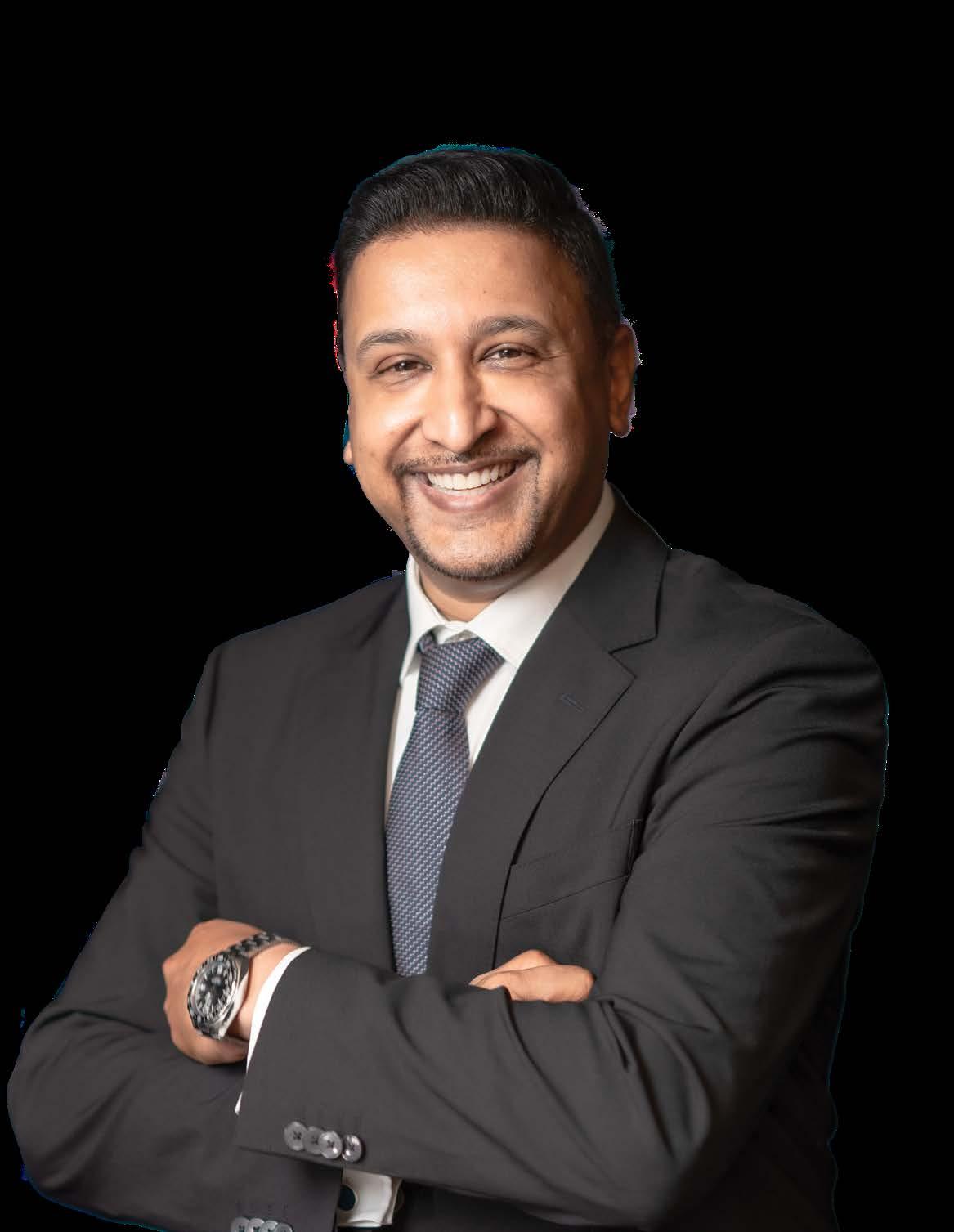

Bahrain . Kuwait . Oman . Qatar . Saudi Arabia . UAE . Egypt . MENA . Asia . Europe . The Americas August 2023
of
Alef Education: Shaping the Future
Education
Rethinking financial education Gulf’s economic performance: Top MBA Programs A magnet for investment banks
2 conomy middle east August 2023
1 conomy middle eastAugust 2023

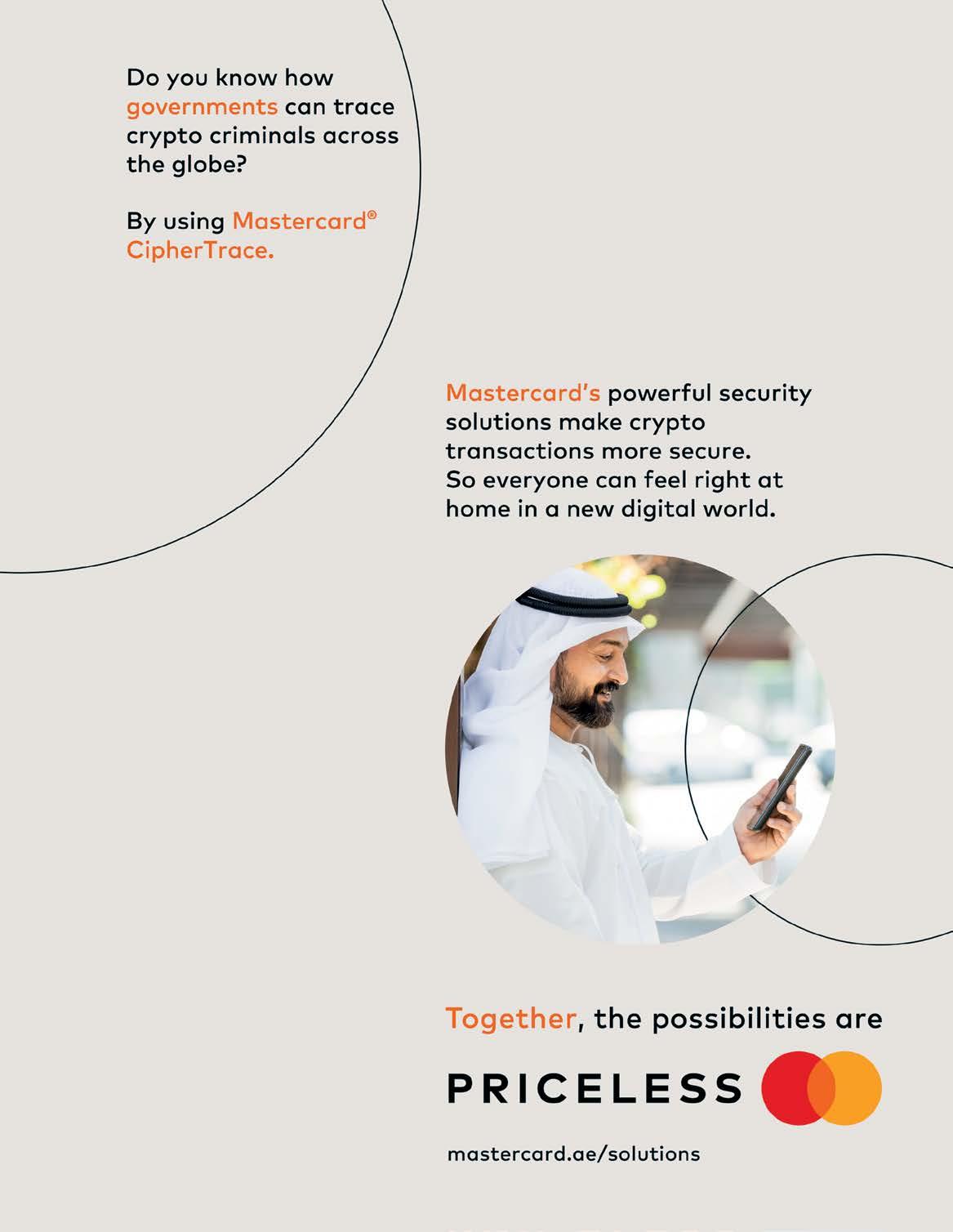
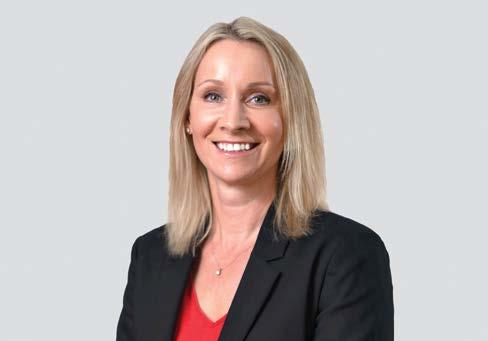





MBA programs to enhance career prospects Challenging global financial order Contents | august 2023 Education Economy Banking & Finance Adapting to a changing business landscape Rethinking Financial Education Cover story with Geoffrey Alphonso, CEO, Alef Education Alef Education: Shaping the future of education 28 40 32 16 China’s economic growth stalls amid uncertainties A global catalyst no more? 34 36 Region's strong economy attracts investment banks Is an MBA degree still the key to success in an AI-driven world?

Top







6 conomy middle east August 2023 Contents | august 2023 Legal review Real Estate Lifestyle Sustainability MBA list 46 The right to proper education and dispute resolution in the UAE 44 Education rights Ferrari unveils its latest marvels 64 62 The SF90 XX STRADALE and the SF90 XX SPIDER Ethical journeys with impact What Tomorrow Holds Empowering students to transform the environment 48 50 46 Impact of design on learning experiences Student-centric environments impact performance By
CEO,
Technology
Antonio Pietri, president and
Aspen
MBA programs in the Middle East Navigating the impact of social media on kids' mental health and well-being

Publisher . JOSEPH CHIDIAC
EDITORIAL
Managing Editor . HADI KHATIB
Senior Editor . ANTHON GARCIA
Editor-at-large, Automotive & Lifestyle . ALP SARPER
Economy Contributor . HALA SAGHBINI
Energy Contributor . KATE DOURIAN
Digital Editor & Translator . ELIAS AL HELOU
Multimedia Editor . SERENE ABDUL BAKI
Social Media Editor . AYA ABOU DIAB
CONTRIBUTORS
ANTONIO PIETRI, JASON BURNSIDE, MARILYN PINTO, MAROUN ABOU HARB, SORAYA BEHESHTI, STUART REES JONES
Content Strategy & PR Director . CYNTIA BSOUSSI
Creative Director . RAYAN BARAKAT
For General Inquiries: info@jcmediagroup.com
For Editorial Inquiries: editorial@jcmediagroup.com
For Advertising Inquiries: commercial@jcmediagroup.com
Publishing House . JC MEDIA GROUP LLC
www.JCmediagroup.com
www.EconomyMiddleEast.com
@economymiddleeast
@economy_me
8 conomy middle east August 2023
Printed
Masar Printing
Publishing LLC
at
and
NOTICE Opinions and views expressed in this publication are solely those of the contributors and not necessarily those of the publisher. No part of this publication may be reproduced or transmitted in any form or by any means without written permission of the publisher. When you have finished with this magazine, please recycle it. recycle
Decarbonising. Faster. Together.


conomy middle eastAugust 2023
ADIPEC, the world’s largest energy exhibition and conference, brings together the ideas, ambition, technology and capital needed to accelerate the urgent, collective and responsible action that can decarbonise and future-proof our energy system. Under The Patronage of H.H. Sheikh Mohamed Bin
Al Nahyan, President Of The United Arab Emirates 2-5 October 2023 Abu Dhabi, UAE
Numbers 160,000 Energy professionals 15,000 Conference delegates 54 NOCs, IOCs, NECs and IECs 350 Conference sessions 30 Country pavilions Conferences 10 2,200 Exhibiting companies 1,600 Conference speakers Register as a visitor Register as a delegate www.adipec.com Supported by ADIPEC brought to you by Host city Knowledge partner Technical Conference organised by Strategic insights partner Venue partner Official travel partner Official hotel partner Partners Gold sponsors Platinum sponsors
Zayed
ADIPEC in
Investing in minds: The imperative for quality education amid challenges
Some time ago, I came across an immensely important article penned by António Guterres, secretary-general of the United Nations. In it, he emphasized the paramount significance of education as a pathway to self-development and the progress of societies.
The article vividly illustrates how education stands as one of the fundamental building blocks of human capital, playing a pivotal role in driving sustainable development. It is worth noting that education holds the fourth position among the 17 Sustainable Development Goals, calling for equitable and comprehensive quality education for all and fostering lifelong learning opportunities.
Unfortunately, the COVID-19 pandemic has dealt a significant blow to this goal. Over three years, the disruption to education has exacerbated the existing global education crisis, with UNICEF reporting alarming figures of millions of children being deprived of education. This poses a grave threat of creating ill-informed and isolated communities.
Each year, a staggering quarter of a billion children worldwide are denied access to education for various reasons. Without prompt action to provide the necessary resources and reach out to these deprived children, this number is projected to grow continuously. To tackle this pressing issue and facilitate
the recovery of education, it is imperative to allocate more funds in budgets dedicated to this purpose.
In the Middle East and North Africa region, education takes precedence on the agenda, despite facing significant disparities between countries. Notably, Gulf countries have recently shown commendable progress by allocating increased funds to education ministries, leading to MENA universities achieving prestigious rankings among the world’s top 100 universities. However, despite these positive developments, significant challenges persist and demand immediate action. Soaring inflation rates, debt burdens, climate change, and growing pressures are not only affecting the Arab world but also impacting countries worldwide.
According to the World Bank, failure to address these educational setbacks could result in today’s students in the MENA region losing 10 percent of their future annual income or a staggering total of $800 billion in their lifetime.
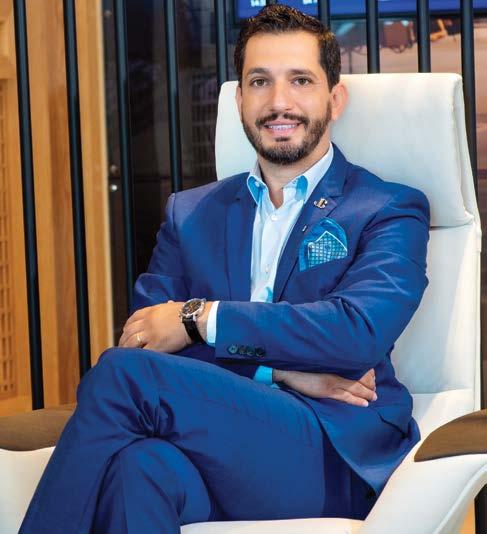
Thus, it becomes paramount to continue focusing on long-term development goals that build resilience and enhance prosperity. To secure a better future for our children, it is crucial to allocate the necessary investments and resources to improve the quality of education. Only through concerted efforts and cooperation can we pave the way for a brighter and more prosperous future for generations to come.
Chief Executive Officer – Publisher
10 conomy middle east August 2023
Joe Chidiac EDITORIAL LETTER

UAE banking sector ranks first in global consumer trust index

The UAE banking sector ranked first in Asia, Africa, and Europe in the global Annual Trust Index Survey. Conducted by the UAE Banks Federation, in collaboration with a global financial market research firm, the survey revealed an outstanding consumer trust level of 84 percent in UAE banks for the year 2022.
This remarkable achievement surpasses prominent financial centers such as Singapore, Hong Kong, and the US, establishing the UAE banking sector as a reliable and top-notch provider of financial services. Notably, the sector outperformed the global average trust index, which stood at 67 percent. For two consecutive years, the UAE banking sector has maintained its position as the most trusted sector, with a
steady climb in its trust index over the past four years.
Survey respondents expressed high levels of confidence in the customer-centric approach adopted by UAE banks, with a remarkable 85 percent confirming that their needs are being prioritized.
The UAE’s consistent performance in the annual trust index serves as further confirmation of the strong fundamentals of the UAE banking sector. This accomplishment highlights the sector’s commitment to maintaining trust and providing exemplary financial services to consumers.
In May 2023, Saudi Arabia experienced a 37.7 percent drop in oil exports, amounting to SAR72 billion ($19.19 billion), representing a decrease of SAR43.5 billion. Simultaneously, imports of goods surged by 20.9 percent, or SAR11.7 billion, reaching SAR67.7 billion.

The decline in commodity exports was even more pronounced, plummeting by 32.1 percent in May 2022, with the total value reaching SAR97.1 billion, compared to SAR143 billion in the same month the previous year. Despite this, the merchandise trade balance recorded a surplus of SAR29 billion in May 2023, showing a positive trend compared to the SAR87 billion surplus in the corresponding month of 2022.
Moreover, in April 2023, Saudi Arabia’s merchandise exports declined by 25.2 percent, with a total value of SAR103 billion, compared to SAR137.7 billion in April 2022.
The decline in oil prices earlier that month prompted the Kingdom to announce an extension of further cuts in oil production, in addition to the cuts agreed upon within the OPEC+ alliance.
Non-oil exports, excluding re-exports, also suffered a notable decrease, declining by 19.2 percent in May 2023 compared to the previous year. China remained Saudi Arabia’s largest export destination, accounting for 17.4 percent of total exports, followed by India and Japan. Similarly, China was the largest supplier of goods to the Kingdom, making up just over 23 percent of its total imports in May. The total value of the Kingdom’s merchandise imports increased by 21 percent in May 2023, reaching SAR67.7 billion.
12 conomy middle east August 2023 short news
Saudi trade balance shows SAR29 billion surplus despite drop in oil exports
Survey finds confidence high among bank customers
Oil exports drop by 37.7 percent to SAR72 billion
Kuwait reports first budget surplus in nine years

Country sees an impressive 54.7 percent increase in revenue
Kuwait’s Finance Ministry has reported its first budget surplus in the past nine years. The surplus amounted to 6.4 billion Kuwaiti dinars, or approximately $20.86 billion. This positive outcome was primarily driven by the government’s revenue from oil sales during the 2022-2023 financial year. During the financial year that concluded on March 31, Kuwait experienced an impressive 54.7 percent increase in revenue, reaching 28.8 billion Kuwaiti dinars, compared to the 18.6 billion Kuwaiti dinars recorded in the preceding year. Notably, the fiscal year of 2021-2022 had a deficit of 4.34 billion dinars. According to the ministry’s final financial report, oil constituted a significant portion of the total revenue for the past year, making up 92.7 percent, with an average oil price
of $97.1. Approximately 93 percent of this year’s surplus came from oil revenues, which experienced an impressive 64.7 percent increase compared to the previous year. In contrast, non-oil revenues saw a decline of 12.8 percent from the preceding year. It’s worth noting that Kuwait has yet to fully explore diversifying its revenue sources. This budget surplus signifies Kuwait’s ambitions to further increase oil production and invest $300 billion in the energy sector by 2040. Moreover, the government’s plans include creating a new sovereign fund aimed at boosting the local economy, leading major projects, and attracting investments from foreign investors and the private sector.
QFZ, QDB join forces to strengthen Qatar's investment landscape
Partnership will provide essential support for investors in free zones
In a new joint initiative, the Qatar Free Zones Authority and the Qatar Development Bank have announced their collaboration to improve the investment climate in Qatar. The focus of this partnership is to support investors who operate in the free zones by offering them a diverse range of financial and advisory programs and services provided by QDB.

With the objective of showcasing itself as a distinctive investment destination in the region, the Qatar Free Zones Authority is taking a proactive approach in expanding its partnerships with key national stakeholders. This landmark deal with QDB underscores QFZ’s determination to solidify
its position as a prominent player in the investment industry.
According to Sheikh Mohammed bin Hamad bin Faisal Al-Thani, the collaboration with QDB is aligned with the Qatar National Vision 2030, as it supports the development and diversification of Qatar’s economy.
The CEO of QFZ believes that this partnership will provide essential support for investors operating in the free zones, enabling them to grow and prosper in a favorable investment environment, and expanding the horizons of investment and development in Qatar.
Abdulrahman Hesham Al Sowaidi, the CEO of QDB, highlighted that the collaboration with QFZ will assist Qatari companies registered in free zones, facilitating the launch and expansion of their businesses. This cooperation will enable these companies to achieve their goals and make significant contributions to Qatar’s economic growth.
13 conomy middle eastAugust 2023
Egypt reports $146 million increase in forex reserves
The Central Bank of Egypt has reported an increase of $146 million in foreign exchange reserves for the month of June, marking the reserve’s tenth consecutive monthly increase. According to data released lately on the central bank’s website, foreign exchange reserves rose to $34.806 billion at the end of June, up from $34.660 billion at the end of May.
Egypt has been grappling with economic challenges, including rising prices of goods and services due to an increase in the dollar price and a decrease in the pound. Moreover, the country has faced difficulties in providing

Reserves rose to $34.806 billion at the end of June sufficient dollar flows. The first review of a $3 billion IMF loan program, which was initially scheduled for mid-March, has been delayed.
Since the end of last year, the CBE has committed to adopting a flexible exchange rate, which is one of the conditions of the country’s agreement with the IMF to prevent foreign reserves from being eroded by currency subsidies.
In an effort to address economic uncertainties, Egypt has cut its currency three times in about a year, and the current official exchange rate stands at nearly 31 pounds, while it is much higher on the black market.
The North African country reached an agreement with the IMF last December to obtain a new $3 billion loan, but only one tranche worth $347 million has been disbursed so far.
Despite these challenges, the value of foreign reserves in June represents the highest level recorded since the beginning of the current year. The previous records for 2023, according to Central Bank data, were $34.224 billion in January, $34.352 billion in February, $34.447 billion in March, $34.551 billionin April, and $34.660 billion in May.
Saudi logistics to witness growth with 59 new zones
Out of the planned logistics zones, 21 are already operational demand for logistics services by establishing additional facilities, considering it currently handles 12 percent of the global container trade annually.

Saudi Arabia has unveiled plans to establish 59 logistics zones by 2030 as part of its ambitious Vision 2030 strategy. The goal is to enhance its logistics capabilities and become one of the top 10 countries in the Logistics Performance Index (LPI). The highest-ranked country from the Middle East is the United Arab Emirates at 12th. Currently ranked 41st on the LPI, Saudi Arabia aims to increase its ports’ capacity to over 40 million containers to support this growth. To fuel business growth and attract investment, 21 out of the 59 planned logistics zones are already operational. Furthermore, Saudi Arabia hopes to meet the rising global
H.E. Dr. Rumaih Al Rumaih, Deputy Minister of Transport & Logistics Services announced the upcoming Maritime Industry Sustainability Conference. The conference, held under the theme, “Innovation for a Greener Future,’ will take place in Jeddah from September 4 to 6.
“We are pleased to actively pursue tracks of cooperation with IMO and its member states regarding initiatives that promote climate, cooperation and seafarers,” Al-Rumaih said.
The three-day conference will focus on sustainability in the maritime industry and its impact on the environment. It will feature more than 50 expert speakers from the maritime sector, covering a wide range of topics. There will be over 2,000 exhibitors featuring products and services from companies and organizations from around the world.
14 conomy middle east August 2023
short news
Dubai sees completion of nine real estate projects worth AED4.06 billion in H1 2023
Dubai Land Department issues 4,416 real estate licenses

Dubai’s real estate sector demonstrated its strength and allure in H1 2023, with the successful completion of nine real estate projects valued at AED 4.06 billion. This accomplishment, along with the ongoing development of 392 other projects in the emirate, cements Dubai’s position as a premier global real estate investment destination, showcasing its potential for sustained long-term growth. The confidence of both local and international investors in Dubai’s real estate market remains evident, with a notable 42,583 real estate units registered during the first half of the year. The market also witnessed impressive sales figures, with 47,187 units sold for AED 96 billion, and 5,546 villas sold for AED 15 billion. The increased demand is further illustrated by the registration of 174 real estate developers in the Dubai
Land Department’s database.
In parallel, the rental market experienced a robust performance in H1 2023, with a total of 355,515 lease contracts registered. Among these, 166,368 were new contracts, while 189,147 were lease renewals, highlighting the continued appeal of Dubai as a residential destination.
Moreover, the growing demand for real estate activities led to a substantial increase in real estate licenses issued during the first half of 2023. The Dubai Land Department granted 4,416 real estate licenses, witnessing a remarkable growth rate of 55 percent compared to the first half 2022.
The period also saw a remarkable surge in real estate transactions, totaling 76,119 transactions worth AED 283 billion. The area of Al Barsha South Fourth emerged as the top-performing location with 7,228 transactions among the top 10 areas for real estate transactions during this period.
Kuwait to invest $300 billion in energy sector until 2040

Country aims to increase oil production to 3.2 million BPD by 2024
Kuwait’s Deputy Prime Minister and Oil Minister Dr. Saad Al-Barrak recently unveiled a plan to invest over $300 billion in the energy sector by 2040. Speaking at the 8th OPEC International Seminar in Vienna, Al-Barrak emphasized that meeting global energy demands necessitates annual investments of approximately $500 billion.
One key aspect of Kuwait’s strategy is increasing oil production capacity, which Al-Barrak said the country plans to boost to 3.2 million barrels per day by 2024. In addition, Al-Barrak expressed his country’s commitment to environmental concerns. He announced Kuwait’s
readiness to collaborate with the UAE to ensure the success of the crucial climate and environmental event, the 2023 UN Conference of the Parties (COP28), scheduled to take place by the end of this year. Kuwait aims to achieve net-zero carbon emissions by 2050 and intends to invest in alternative and eco-friendly energy sources, further solidifying its position as a global energy center.
Despite being rich in oil reserves, Kuwait is looking toward a greener future, setting an ambitious goal to generate 15 percent of its total power output from renewable sources by 2030. This represents a significant increase from the current contribution of less than 1 percent of renewable energy. However, the transition comes with challenges, such as the harsh desert climate that can impact the efficiency of solar panels and wind turbines. Moreover, the lack of skilled labor and technical expertise in the renewable energy sector poses a considerable hurdle.
15 conomy middle eastAugust 2023
Alef Education: Shaping the Future of Education
Company leverages technology and innovation to enhance learning experiences

cover story
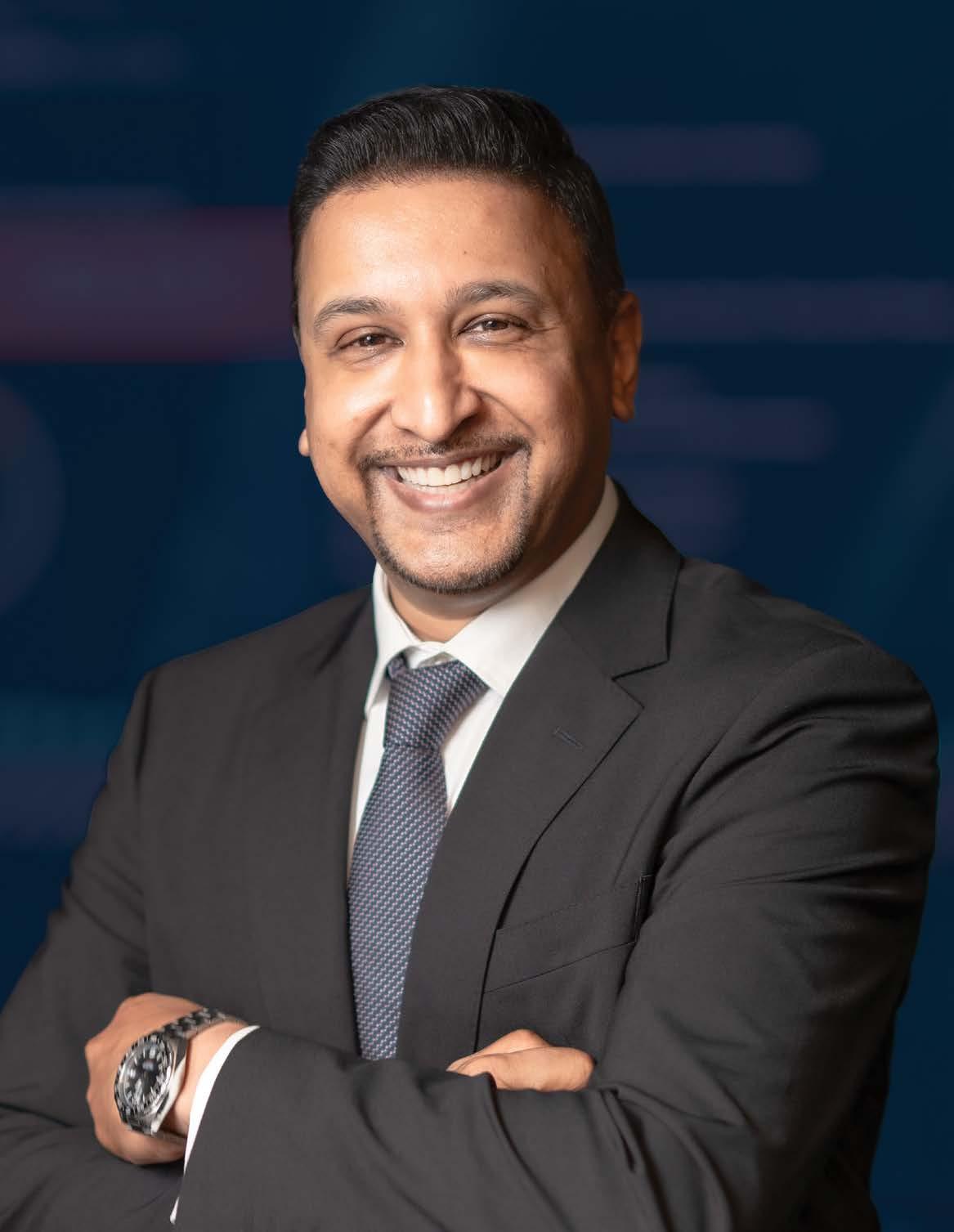 Geoffrey Alphonso CEO, Alef Education
Geoffrey Alphonso CEO, Alef Education
Alef Education’s mission is to transform the education ecosystem. How were you able to accomplish this? What were the key milestones that helped you achieve your goals?
Alef Education was established in 2017 to transform the education ecosystem by providing accessible, personalized, and innovative solutions that inspire a love of learning and equip students with the skills needed to succeed in the Information Age. We initially focused on creating a technology-integrated primary mode of education but soon expanded our vision to include a global digital transformation of K-12 education. Our products are designed for students with different abilities and learning styles: we use cutting-edge technologies such as artificial intelligence (AI), personalized learning, and big data analytics to digitize, enhance, and innovate the education sector. This tailored approach ensures that students progress independently. Content is aligned with the local curriculum, and interactive exercises adapt to their strengths and challenges. Using the best technology, data science, and learning materials, we have created a paradigm shift in education and impacted more than 820,000 students and 40,000 teachers.
Our award-winning flagship product—the Alef Platform—is at the heart of our success and has been proven to improve learning outcomes for K-12 students. The AI-powered platform provides data-driven insights and enables realtime feedback and support for educators as they mentor and evaluate their students. We also developed Abjadiyat, an interactive Arabic language platform for K-4 students. Alongside this is Arabits, a comprehensive AI-powered digital curriculum for non-native Arabic learners. The
Founded in 2017, Alef Education emerged with a bold vision: to transform student learning experiences and the education ecosystem through innovative technologies like artificial intelligence, big data and machine learning.
In this exclusive interview, CEO Geoffrey Alphonso shares the inspiring journey of this Abu Dhabi-based company, starting as a home-grown startup and evolving into a prominent global EdTech firm, making a profound impact on students and teachers worldwide.

He also outlines his vision for the future of education.
app has been downloaded over 1.8 million times since its launch in 2021, and it facilitates Arabic language learning for approximately 80 percent of the UAE population who do not speak Arabic, in addition to students. More recently, we have expanded our portfolio to include Math Pathways and ELA—two educational programs that provide students with comprehensive support for foundational math and literacy skills. Math Pathways is a student-centered, selfpaced supplemental math program that uses interactive learning content, personalized diagnostic assessments, and recommended developmental pathways to help students learn at their own pace. ELA is a simple, effective approach to teaching foundational literacy skills that provide discrete skill instruction through videos and engaging interactive readers. Both programs offer immediate feedback from students and teachers through assessments and content review games.
We have achieved several significant milestones in our quest to transform education, most notably during the COVID-19 pandemic. Since then, we have continued to expand our product and user base. We are available in more than 4,000 schools worldwide, from the United Arab Emirates to the US, Indonesia, and Morocco. We have extended our reach to more students worldwide and continuously refined our solutions to make learning more personalized and engaging. We actively collaborate with governments and educational institutions to advocate for a data-driven approach to education, ensuring informed decision-making backed by data science.
Alef Education is dedicated to equipping teachers with the tools and resources they need to excel in their roles and recognizes their fundamental role in shaping students’ educational experiences. Through these initiatives, we aim
18 conomy middle east August 2023
cover story
to transform education by creating a more equitable and inclusive learning environment for all students: technology and successful pedagogy allow learners to fulfill their unique potential.
Alef Education’s learning platform provides personalized and engaging learning experiences. Can you elaborate on the role that AI and machine learning (ML) play in this? Will AI be able to help students independently of teachers in the future?
We use artificial intelligence (AI) and machine learning (ML) to provide students with personalized and engaging learning experiences. These technologies are essential to improving educational outcomes by gathering information about student learning and developing student models. Our digital learning solutions employ intelligent tutoring systems and continuous assessments to collect data and provide meaningful insights about learners. This datadriven approach enables educators to tailor learning experiences to individual students and adapt materials to their learning styles and levels. By analyzing vast amounts of data, AI and ML algorithms identify patterns and trends that help create personalized pathways to success. The Alef AI Tutor is an intelligent tutoring system that assists students in classroom activities, providing support and information on subject topics.
One notable application of AI and ML in education is early intervention. Our digital learning solutions use a hybrid assessment and intervention mechanism that employs adaptive diagnostic tests and predictive models. These tools identify students who may be struggling. They adjust in real-time to determine their level of knowledge in different domains and grade levels. This approach provides a comprehensive understanding of each student’s abilities by disregarding assumptions about a student’s ability, grade level, or language level. By using AI-powered predictive models, our products track user activity, courses taken, and feedback to identify students at risk of failing. This early identification allows teachers to intervene immediately and give students the support they need to get back on track.
While AI and ML can be helpful teaching assistants, they are not designed to replace the face-to-face aspect of a physical teacher. Instead, they serve as tools to assist teachers with their teaching practices. AI and ML provide educators with valuable data and insights to make informed decisions about instructional strategies, differentiate instruction, and provide targeted support to individual students. The potential for AI to help students
independently of teachers is a possibility as technology continues to advance. AI could play a more autonomous role in providing personalized instruction and support. However, it is important to strike a balance and preserve the valuable human element of education. While AI can enhance and improve the learning experience, the role of teachers in fostering critical thinking, social and emotional development, and personalized mentoring remains essential.
The Alef Platform collects millions of data points every day. What do you do with this data, and how does it impact student learning experiences on the platform? Given data privacy concerns, how do you promote a secure digital learning environment?
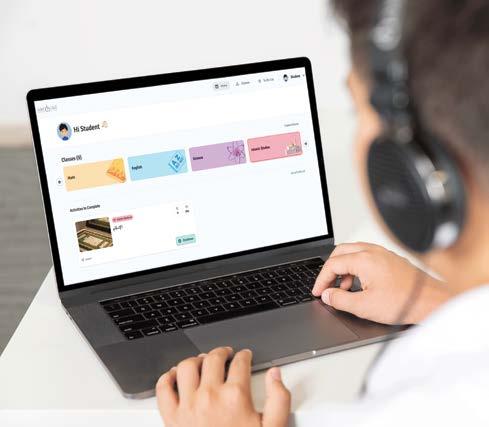
We collect millions of data points every day that are vital to improving student learning experiences with our digital learning solutions. The vast amount of data collected allows us to create personalized learning pathways tailored to individual student needs, strengths, and challenges. Our products can adjust content, pacing, and instructional strategies to optimize student engagement and performance by analyzing these data points.
The data collected by our digital solutions provide students with personalized recommendations, adaptive assessments, and real-time feedback. This level of personalization ensures that each student receives targeted instruction and support to help them progress at their own pace and overcome any barriers to learning. Our products identify areas where students need additional practice or intervention so educators can provide timely and targeted interventions to support learning.
Data also plays a crucial role in assessing student progress and achievement. By analyzing the data collected,
19 conomy middle eastAugust 2023
"We use cutting-edge technologies... to digitize, enhance, and innovate the education sector."
educators gain valuable insight into student strengths, weaknesses, and learning patterns. This information helps teachers make informed decisions about instructional strategies, identify areas that require additional attention, and tailor their instructional approaches to meet individual student needs. Additionally, the data collected by Alef Education’s platform enables continuous improvement and innovation. By analyzing trends and patterns in the student population, the platform can identify areas for improvement and refine its algorithms and content. This iterative process allows for ongoing optimization and ensures that the platform evolves to meet the changing needs of learners. When it comes to privacy, protecting student data is a top priority for Alef Education. We adhere to industry standards and regulations such as FERPA and COPPA in the United States and the EU GDPR. We employ robust encryption methods to protect student data during transit and at rest, ensuring that sensitive information remains confidential and protected from unauthorized access. We also conduct regular security audits and penetration tests and remediate system vulnerabilities to strengthen our cybersecurity measures further. We also prioritize educating users, including parents, teachers, and students, about privacy and data security best practices. We provide resources such as privacy guides, tutorials, and workshops to raise awareness and empower users to make informed decisions regarding their data.
Saudi MCIT and Huawei sign ICT MOU
Alef Education showcased its innovative EdTech solutions to a global audience at Expo 2020 Dubai. At COP28, you will have the same opportunity. What sustainability-focused practices will you share with the world this time? How is Alef Education contributing to the net-zero commitments of the UAE? What are your own ESG principles?
As a pioneer in education technology, we are committed to showcasing our innovative digital learning solutions at global events. Building on the success of our participation at Expo 2020 in Dubai, Alef Education is also preparing to share its sustainability-focused solutions with the world at COP28. Our participation at COP28 is also significant because we are a strategic partner of the UAE Ministry of Education. During COP28, we plan to showcase our efforts to promote sustainability through various initiatives, including the EcoChamps Carbon Literacy program, the Alef metaverse, and our commitment to ESG principles. In partnership with the Ministry of Education, Cambridge Partnership for Learning, and the Carbon Literacy Project, we are working with schools in the United Arab Emirates to deliver the EcoChamps Summer Program. This program

provides students with an understanding of climate change, sustainability, and the importance of action. It includes engaging activities such as interactive games, educational videos, and field trips, all integrated into the curriculum. In this way, Alef Education equips students and educators with the knowledge and tools to address the challenges of climate change and environmental degradation. Alef Education is building a metaverse to promote sustainable education further and will present it at COP28. By using this technology, we will create immersive learning experiences that make sustainable education more engaging and effective. Through virtual reality with highresolution visuals, advanced spatial audio technology, and immersive digital content, Alef Education will engage users in a truly immersive experience that allows students to learn about carbon literacy and sustainability principles through a series of missions that teach them about conservation and show them the impact of their actions in real-time. We are pleased to be a part of Educators Voice at TeachersCOP, an event organized by the Office for Climate Education (OCE) in collaboration with the UAE Ministry of Education during the upcoming COP28 in Dubai later this year. This initiative will allow teachers to voice their opinions on climate change and sustainability. Teachers are crucial to promoting sustainable education, and we are committed to supporting them in any way we can.
At Alef Education, we proudly contribute to the UAE’s ambitious net zero commitments. We actively support the country’s transition to a low-carbon economy through sustainable practices and education initiatives. We are nurturing the next generation of sustainable leaders by equipping students with the knowledge and skills they need to meet the challenges of climate change and sustainability by raising the next generation of sustainable leaders.
20 conomy middle east August 2023 cover story
"Alef Education is building a metaverse to promote sustainable education."
How does Alef Education’s learning platform support teachers, and how has it impacted teaching methods and performance?

At Alef Education, we understand the importance of supporting and developing educators in creating an effective and sustainable education system. Through a range of professional development offerings, customized training, and ongoing support, we empower teachers to integrate technology and seamlessly improve their teaching practices. We offer comprehensive professional services, including CPD programs that provide teachers with the knowledge and skills to use technology tools in their classrooms. Our team provides personalized training and ongoing support to familiarize teachers with the features and functions of the Alef Platform. In addition, the Alef Academy offers self-paced courses and resources focused on practical implementation strategies and best practices for digital learning. Through these professional services and access to the Alef Academy, we enable teachers to integrate the platform and improve their teaching practices. The Alef Academy also provides content that introduces new approaches, trends, and pedagogy in education to improve educators’ knowledge and skills and enable them to use the Alef Platform effectively.
We also have a dedicated team of Digital Learning Implementation Specialists (DLIS) who support schools and educational institutions. These specialists visit schools to provide coaching and training on the Alef Platform’s features and classroom use cases. The team focuses on data-driven decision-making, helping teachers and school leaders read and analyze Alef Platform data through comprehensive dashboards. We also provide comprehensive technical support to ensure the smooth operation of the technology infrastructure through our on-site IT support specialists. We provide ongoing support from equipment setup and troubleshooting to maintenance and system updates.
The impact of the Alef Platform on teaching methodologies and performance has been significant. Its multitude of features which include adaptive skills instruction, curriculum-aligned lesson plans, personalized learning features, inquiry-based learning opportunities, real-time progress reports, data analytics, and interim checkpoints, have all contributed to improvements in teaching practices. Our efficacy studies determine that over 13,500 thousand teachers have been
trained and upskilled using the Alef Platform. In 2022, 208 training sessions were conducted, and customer satisfaction scores were 95 percent. We work with teachers to help them leverage technology, including tools such as the Alef Platform, which has proven to be a valuable tool for teachers to improve their instructional practices, transform their teaching, and help students reach their full potential.
What do you think about the future of education in the UAE and the rest of the world?
The education system in the UAE and the rest of the world is undergoing a significant transformation driven by technological advances. We are witnessing a shift towards personalized and blended learning approaches that cater to the individual needs of students. As a leading EdTech company, we are at the forefront of this shift in education and are committed to providing high-quality, personalized education to students worldwide.
Personalized learning is a growing trend, with educators recognizing the importance of tailoring instruction to students’ individual needs. Blended learning, which combines traditional face-to-face instruction with online learning, is also gaining traction as the preferred educational model. In this approach, traditional classroom instruction is combined with online learning so that students can benefit from the advantages of both worlds. In addition, integrating AI into education is a significant movement with enormous potential. AI-powered tools can personalize learning, provide real-time feedback, and automate administrative tasks to enhance the educational experience.
We are excited about the future of education. We believe that technology has the potential to transform education and make it more accessible and effective for all students. We are committed to ensuring that our solutions help students reach their full potential and positively impact the world. For example, generative AI can personalize learning and engage students in ways that were not possible before. Through the use of these technologies, practice assignments can be tailored to individual student needs. Interactive simulations can help students visualize complex concepts to make them easier to understand. Virtual tutors answer questions, chatbots help with homework, and teachers can focus on each learner’s journey. The possibilities are endless!
In the United Arab Emirates, the future of education is bright. The UAE is a forward-thinking country committed to providing quality education to its citizens and residents. Under the guidance of the UAE government, we are helping to shape the future of education in this country. The UAE has the potential to be a global leader in education. And we are committed to making this a reality.
21 conomy middle eastAugust 2023
"Technology has the potential to transform education and make it more accessible for all students."
22 conomy middle east August 2023
23 conomy middle eastAugust 2023
Smarter education for sustainable development
Hamdan Bin Mohammed Smart University spearheads educational transformation with AI
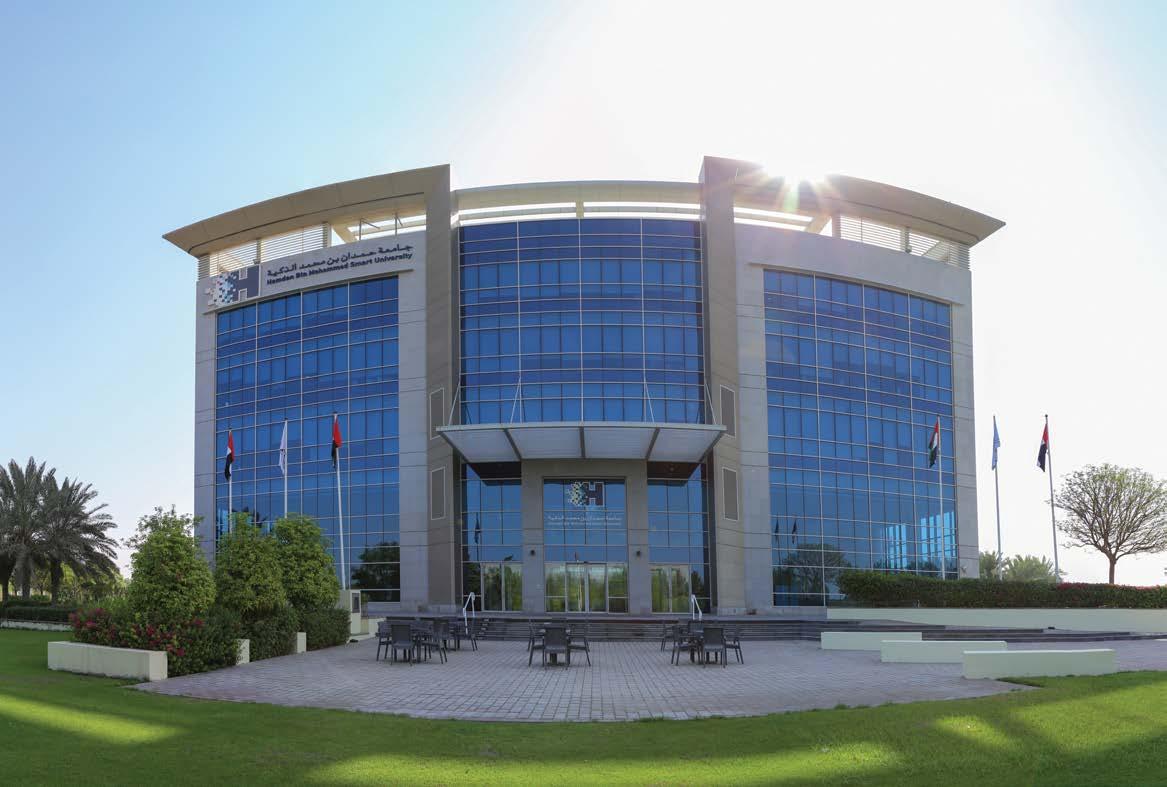
In an ever-changing digital landscape, Hamdan Bin Mohammed Smart University (HBMSU) is at the forefront of reshaping the region’s educational landscape. With the global AI sector in education projected to experience a remarkable 31 percent growth by 2027, H.E. Dr. Mansoor Alawar, chancellor of HBMSU, is leading the charge in embracing innovation. In this exclusive interview, Economy Middle East delves into the pivotal role of AI and future-forward learning in HBMSU’s remarkable journey toward smart education progression.
Why is Education for Sustainable Development so important for higher education?
Higher education holds a crucial role in shaping the future of society, with over 235 million learners currently enrolled in universities worldwide. Empowering these learners to become agents of change is essential. Higher education can drive cutting-edge research and contribute sustainable solutions. Focusing exclusively on knowledge acquisition, without nurturing the development of essential skills, leads to what experts have aptly termed “Premature Education,” a flawed approach that undermines the potential for sustainable development. By
recognizing the importance of both knowledge and skills, higher education institutions can create transformative learning experiences. These experiences not only equip learners to excel academically but also empower them to apply their expertise with competence and innovation.
How does HBMSU incorporate the principles of sustainable development into its educational programs and learning methods?
Quality Education is the fourth United Nations Sustainable Development Goal, signifying a collective commitment to providing every individual with a high-standard education. The aim is to
conomy middle east August 2023
Education
equip all learners with knowledge, skills, and values necessary to thrive in an ever-evolving world. From its inception, HBMSU has remained dedicated to adopting quality as a guiding educational philosophy while nurturing a culture of excellence in its educational and training programs.
In 2006, HBMSU launched the first academic programs in quality management in the UAE, showcasing our dedication to sustainable development through our lifelong learning (LLL) model. This model ensures continuous growth of individuals’ knowledge and skills throughout their lifetimes.
The vision of HBMSU aligns with the objectives of the “We the UAE 2031” vision, underscoring the university’s commitment to sustainability and the promotion of a knowledge-based economy. Our LLL model creates opportunities for the community to acquire knowledge and skills, enabling them to make continuous contributions to economic growth. Since the founding of HBMSU, over 400,000 learners have benefitted from our programs, which are facilitated by our diverse faculty members and associates from 53 countries.
How does the university foster innovation in promoting sustainable and quality education?
HBMSU is deeply committed to the United Nations Sustainable Development Goals. Our programs emphasize interdisciplinary approaches, ethical decision-making, and sustainability leadership, with the aim of equipping our graduates with the knowledge and skills to actively contribute to sustainable development in their respective fields. Moreover, HBMSU has been at the forefront of pioneering educational projects, including the Middle East e-Learning Quality Framework (MeLQ). Developed in collaboration with SCIL, a well-recognized Swiss think tank providing consulting services to educational institutions, MeLQ offers a robust theoretical basis informed by research on technology-enhanced learning, providing a framework for quality in e-Learning.
In 2019, HBMSU launched an international consortium, the “Benchmarking Framework for Online,
Open, Smart and TechnologyEnhanced Higher Education,” bringing together prominent universities, associations, and quality assurance experts. This consortium achieved two significant milestones: HBMSU became the region’s pioneer in acquiring the ISO 22301 certification for business continuity management, and it collaborated with partners to establish the Middle East Quality Association. Additionally, our newly introduced Micro-Master programs play a vital role in advancing sustainable education. By bridging skill gaps and offering specialized training in diverse fields, these programs cultivate a proficient workforce, endorsing lifelong learning and interdisciplinary collaboration to foster innovation and drive sustainable development goals.
How does the university engage with local communities and stakeholders to promote sustainable development initiatives?
HBMSU is an active member of many reputable international organizations and institutions, including the International Council for Open and Distance Education, European Learning Industry Group, British Quality Foundation, European Foundation for Quality Management, International Federation of Information Processing, among others. Our collaboration extends to local organizations, government entities and industry partners, as we actively work toward addressing community needs and contributing to sustainable development initiatives. Our primary objective is to establish a robust network that encourages open dialogue, shared learning, and collective action for the advancement of sustainability.
What are your future plans and aspirations for HBMSU regarding education for sustainable development?
HBMSU envisions an educational transformation, driven by the embrace of flexibility to overcome traditional learning obstacles, fueled by advanced technology as a catalyst. Our dedication lies in continually building upon our cumulative expertise, spearheading
futuristic projects to expand and implement the smart learning model, and integrating sustainability into every facet of our institution. We are committed to forging additional partnerships with industry leaders and organizations that share our passion for sustainability. Through digitalization, artificial intelligence, and machine learning innovations, HBMSU will deliver a more inclusive and dynamic educational experience. Our goal is to provide a nurturing environment that fosters creativity and excellence while ensuring unfettered access to educational content, knowledge tools, and empowering resources for all.
Can you share your perspective on the role of AI and technological advancements in transforming and enhancing education for sustainable development?
The UAE ranks 16th globally, and first in the region, on the Government AI Readiness Index 2020 by Oxford Insights. The country’s commitment to AI adoption includes the education sector through strategic initiatives and the UAE Artificial Intelligence Strategy. The country has high hopes for these technologies to stimulate learning.
A report projects a 31 percent annual growth in global AI education by 2027, empowering learners to innovate solutions. HBMSU leads in the region, offering the popular “ChatGPT in smart learning” course with over 9,000 registrations. Our goal is to prepare a generation capable of leading AI programs, overcoming education challenges through strong partnerships for a sustainable future.
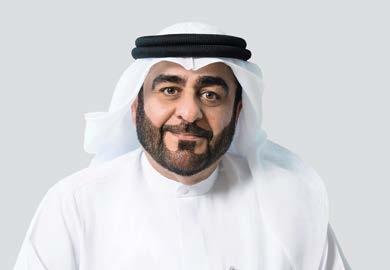
25 conomy middle eastAugust 2023
H.E. Dr. Mansoor Alawar, chancellor, Hamdan Bin Mohammed Smart University
Abu Dhabi University defines artificial intelligence as universal skill

AI drives us toward
In an insightful interview with Economy Middle East, Professor Ghassan Aouad, the chancellor of Abu Dhabi University, sheds light on the profound impact of AI on the educational landscape. Delving into the remarkable transformations that higher education has undergone since the advent of Artificial Intelligence (AI), he emphasizes the exciting new experiences that students now encounter in their pursuit of knowledge. As priorities in education increasingly shift toward adaptability, resourcefulness and creativity, Aouad reveals the empowering effects of AI on both teachers and students, fostering a dynamic and innovative learning environment.
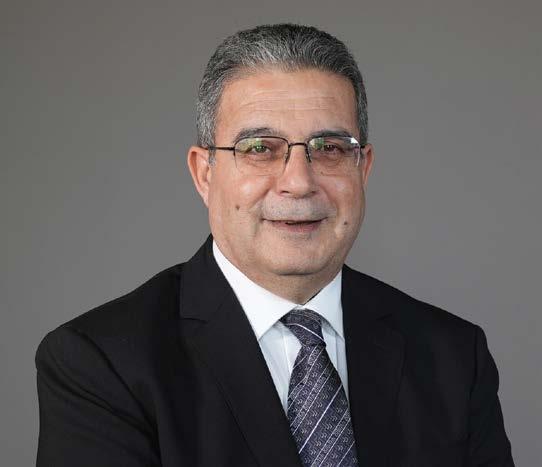
conomy middle east August 2023
Education
As
creativity, ADU fosters future-ready workforce
Professor Ghassan Aouad, chancellor, Abu Dhabi University
How do you see AI transforming the future of education?
AI has been present for almost 70 years, only gaining significant momentum recently. The emergence of generative AI, like ChatGPT, is revolutionizing education. For teachers, AI empowers them to scale fully personalized educational experiences. Meanwhile, AI-assisted students are swift learners with instant access to information. Educational institutions are leveraging predictive analytics to proactively address process shortcomings. Moreover, AI boosts operational efficiency, reduces costs, and improves educational services. AI is propelling us toward innovation and creativity. As AI takes on tasks of diminishing value, institutions must prioritize nurturing skills that offer unique value beyond AI. AI revolutionizes assessments, putting emphasis on complex problem-solving and advanced skills while reducing reliance on knowledge recall or simple skill demonstration. Furthermore, AI offers unmatched performance feedback, enhances research through improved search and communication, and broadens access to quality education by overcoming language, cost and disability barriers.
What are some specific ways ADU is using AI? How do you equip students for future jobs that require AI skills?
ADU has always seen the potential of AI as a transformative force. Since 2014, we have been committed to smart learning, an initiative that continues to thrive through our Center of Excellence. We also established Abu Dhabi University’s Innovation (ADUi) center, serving as a platform for events, lectures, and conferences. This versatile space hosts workshops, providing hands-on learning opportunities for all.
ADU incorporates AI into analysis models to reveal trends, gain insights and aid in decision-making. Additionally, it employs predictive models to enhance and review programs.
AI plays a central role in revolutionizing, digitizing and automating services for students and faculty. ADU embraces AI in various forms, including text, audio and video generation. We carefully regulate
and develop in-house tools and training programs to promote responsible adoption.
At ADU, our efforts are centered around redefining AI as a universal skill. We offer the course, “Introductory Artificial Intelligence,” for Engineering students. Taught by expert professors, this course empowers students to lead AI transformations, creating value for future employers. Furthermore, they learn to tackle real-world challenges using AI techniques and data from their respective domains.
What ethical factors are considered when employing AI in education?
There are several ethical considerations, with one of the most pressing being plagiarism. Ensuring that we assess and report on students’ skill levels, rather than that of AI, is crucial for employers. While tools to detect AI-generated text exist, their false positive rates can be high, posing challenges in preserving academic integrity. Another concern relates to the copyright of the work used as data to train generative AI. These are issues under discussion, and academics must play a role in guiding students through them. Moreover, as the world moves toward achieving Sustainable Development Goals, we must also consider the carbon footprint of training AI models. Educating students about green AI, the importance of sustainable models, and how they can help reduce our environmental impact, become ethical obligations. Teaching students about explainable AI is crucial, as it allows them to better interpret information. Furthermore, as students develop their own AI models, they must be educated on avoiding bias, safeguarding data privacy, and ethically analyzing AI’s performance.
How has the use of AI influenced the role of instructors? Has it led to any significant changes in teaching methods or responsibilities?
In the past, producing individualized experiences was both time and resource consuming. While professors understood the importance of personalized learning and how it represented the future of education, they needed more means
to do it at scale. Now, professors can tailor the experience to each student. Generative AI integrates image, audio, and video generation, producing multimedia and feedback-rich lesson plans on any topic. Further, AI aids in monitoring student participation, emotions, and performance, ultimately enabling deep insights to achieve learning outcomes. Teaching AI-assisted students with readily available knowledge, high expectations, and short attention spans has become a challenge. The professor’s role has shifted towards facilitating learning, and AI accelerates this transformative change. At ADU, we value human connection, class interaction, and discussions. AI won’t replace teachers since quality content remains close at hand.
In your opinion, what are the key advantages and potential challenges of AI in education?
The advantages of AI lie in its ability to reduce the cost of producing highquality and adaptive learning materials, analyze historical student performance data for insights, and reduce the cost and resource requirements for eliminating learning barriers. However, a major challenge is ensuring reliable assessments of student performances. Moreover, there is concern that excessive reliance on AI may lead to the underdevelopment of critical skills. For instance, writing fosters critical thinking, logical reasoning, and expression, all of which are essential for creativity and innovation. If students overly rely on AI, they may face difficulties in forming mental connections necessary to create or express novel ideas.
To address these concerns, ADU has established guidelines for AI use among faculty and students. This approach allows us to harness the benefits of AI while mitigating potential risks. Additionally, several faculty members actively work on analyzing these risks and proposing innovative technological solutions through research and development. ADU is committed to taking the lead in faculty AI training and development, ensuring their preparedness for the future of education.
27 conomy middle eastAugust 2023
Adapting to a changing business landscape
MBA programs serve to enhance career prospects in competitive market
What are some of the advantages of having an MBA degree? What tangible and intangible benefits can be gained by investing in an MBA degree?
An MBA degree offers a myriad of advantages and benefits to those who embark on this challenging yet highly rewarding career path. It instantly signifies a candidate’s exceptional skill level and expertise. Put simply, possessing an MBA enhances job prospects and earning potential, as numerous industries highly value the strategic, managerial and leadership skills it imparts. Moreover,
it facilitates the development of a robust professional network, ushering in opportunities and collaborations. The value of a strong alumni network is immeasurable for many of our graduates, who leverage these connections to propel their careers forward. At the University of Strathclyde Business School, we believe that the practical knowledge gained in business alongside the learning structure offered by our academic experts who are thought-leaders in their fields, is an advantage that gives our graduates a tangible edge. The University of Strathclyde Business
School MBA fosters critical thinking, problem-solving and communication skills – crucial for advancing one’s career. In today’s world, we contend that blending real-life practical skills with academic knowledge is the ideal combination.
The MBA exposes students to diverse perspectives and nurtures a global outlook, which is indispensable in our interconnected contemporary landscape. While considerations about cost and time investment are valid, the enduring benefits in terms of career growth, versatility and personal development make pursuing an MBA a

conomy middle east August 2023
Education
Abigail Davenport, head of Strathclyde Business School, UAE campus, underscores the importance of an MBA degree in securing better job prospects and advancing careers. As this valuable investment promises a multitude of benefits, Davenport provides key insights into the factors to consider when choosing the right MBA program.
worthwhile investment for many. Our students acquire skills such as leadership and an entrepreneurial mindset through the program, which often leads to the establishment of their own businesses. However, the primary aim is to cultivate their creativity, enhance problem-solving abilities within their respective fields, and differentiate them as leaders in their workplaces. This transformation enables students to adapt effectively in the dynamic business landscape.
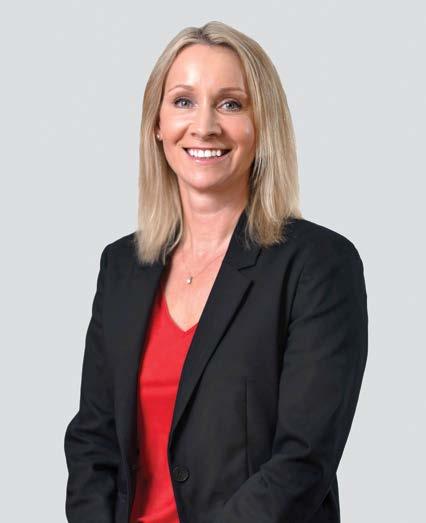
Strathclyde is a triple-accredited business school by the three accrediting bodies AMBA, EQUIS and AACSB.
This initiative serves as an excellent method to ensure the continual updating of knowledge and skills. Bridging theory and practice, global practitioners play an integral role in stimulating and facilitating learning for our MBA, executive education and specialist master’s students. Our Global Practitioners are a new class of colleagues from a diverse range of industries and backgrounds, reflecting the broad nature of subjects addressed in our general management programs and the rich variety of students and colleague profiles in our learning environment. Starting from September 2022, a cohort of 30 Global Practitioners joined the business school to actively contribute to the development and delivery of the MBA and specialist master’s programs.
What skills are currently in demand in the market? What about 10 years from now?
What’s your view on AI and/or ChatGPT being used in education/ learning?
Given Strathclyde’s long history as an institution, how has it innovated in terms of teaching/learning methodologies or approaches?
Strathclyde has always prided itself as a “place of useful learning.” Nearly 90 percent of Strathclyde’s research has achieved a rating of “world leading” or “internationally excellent” in the Research Excellence Framework 2021. Our teaching is strongly informed by our research at all levels: Our internationally acclaimed academics, who actively engage in research, also contribute to the MBA program. “Useful” learning is key and something we’re proud to champion as an institution. Concerning the MBA, we offer a diverse array of contemporary and pertinent elective subjects each year, allowing customization of the MBA based on individual preferences and interests. We have recently introduced a change to the capstone MBA project, affording students the choice between the traditional research dissertation, an entrepreneurial project and a consultancy project. Furthermore, MBA alumni are eligible for one elective per year for three years post-graduation, subject to availability.
The rapidly evolving education landscape must adapt more swiftly than ever to meet market demands. While AI garners significant attention in the digitalization discourse across the Middle East and globally, employers continue to highly value communication, creative problem solving, leadership and analytical thinking skills. Since we were established, our practical approach to learning has always been developed with a deep understanding of practical skills and market needs. There’s always going to be a demand for the MBA and Strathclyde makes sure it incorporates the latest thinking into the MBA. The business world is always going to need individuals who have a wide range of skills, coupled with leadership and strategic skills, and the MBA offers just that.
My perspective on AI, including technologies like ChatGPT, in education and learning is generally positive. However, it’s crucial to approach this with careful consideration; being relatively new, its potential for misuse is on par with its beneficial applications. In my view, AI streamlines administrative tasks, thereby liberating time for actual teaching. Its capacity to process extensive data to inform and enhance educational strategies is noteworthy. It’s imperative to emphasize transparency in AI usage, prioritizing its role as a supportive tool that complements education rather than replacing it. Students must grasp the ethical dimensions of AI use and comprehend how it authentically contributes to their learning. Ultimately, skills such as analysis, critical thinking, communication and interpersonal engagement are irreplaceable. Given the prevalence of remote learning and virtual interactions today, it’s essential to continually underscore their significance and indispensability.
29 conomy middle eastAugust 2023
"While the cost and time investment are considerations, the enduring benefits make pursuing an MBA a worthwhile investment."
Abigail Davenport, head of Strathclyde Business School, UAE
Zayed University fields revolutionary education system
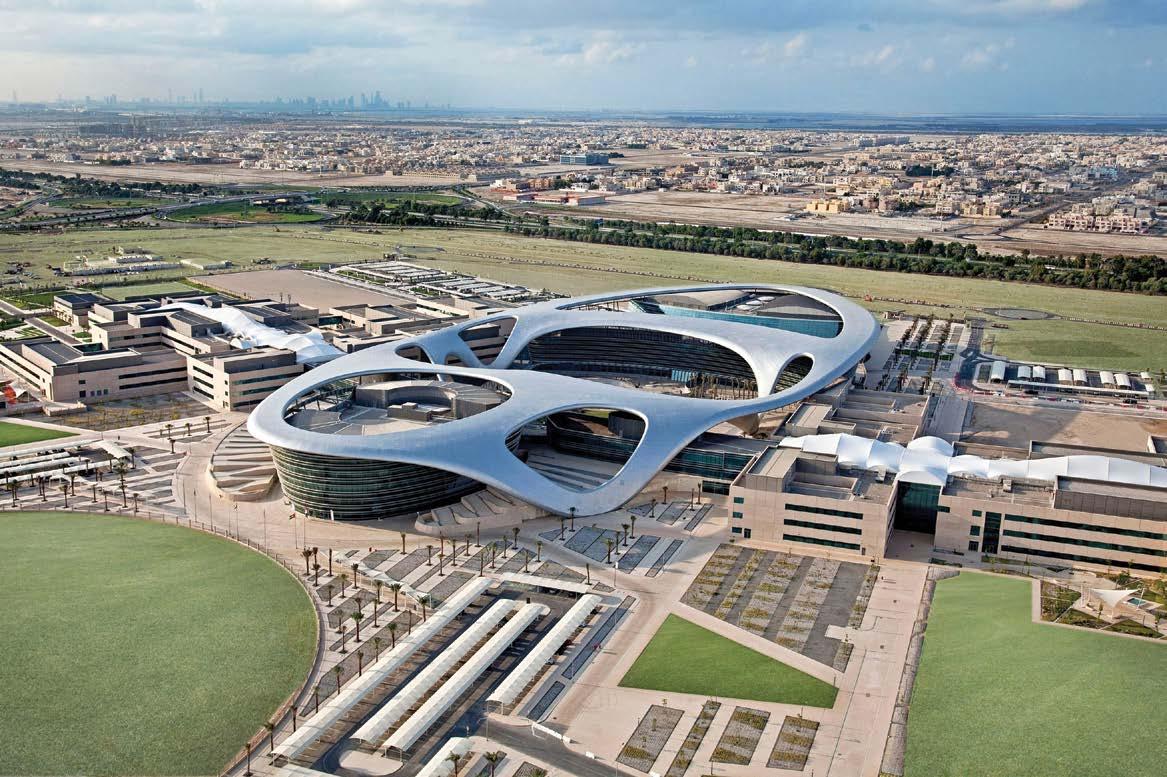
Students develop future work skills, solve real life challenges
Zayed University is introducing innovative degree programs aligned with the UAE’s Centennial 2071 plan and Projects of the 50, aimed at enhancing the education system. As a testament to its commitment to cutting-edge active learning methodologies, ZU presents the distinctive Partner Challenge Program, enabling students to collaborate with both local and international enterprises. In an insightful discussion with Dr. Michael Allen, provost and chief academic officer at Zayed University, Economy Middle East explores the myriad aspects that distinguish ZU as a trailblazing institution in the realm of education.
Can you describe the new degree programs being offered at ZU?
Zayed University’s degree programs address pressing global challenges in business, technology, society and sustainability. They foster a new generation of empowered graduates, equipping them to be responsible global citizens who contribute actively to a stronger UAE, particularly within the private sector.
Our offerings encompass four interdisciplinary majors –Business Transformation, Computational Systems, Social Innovation and Sustainability – which feature various concentrations and specializations. Additionally, we provide a diverse array of Creative Arts programs. All students embark on a two-year General Education program, the first of its kind in the UAE, which instills foundational skills such as critical thinking, communication and teamwork. As students progress, they delve deeply into their chosen majors. By combining general education, interdisciplinary learning and specialization, our graduates
conomy middle east August 2023
Education
emerge with both broad skills and in-depth expertise. This synthesis of specialized knowledge and enduring skills ensures our students gain expertise applicable to both the UAE and the broader global context.
What pioneering active learning techniques is ZU applying in its teaching methodology?
At Zayed University, we have completely eliminated exams from our new programs. We believe that exams do not effectively drive or enhance learning, nor do they adequately prepare graduates to meet the demands of the modern workplace. Instead, we have adopted a system of continuous assessment methods that actively encourage student participation and engagement throughout the academic year.
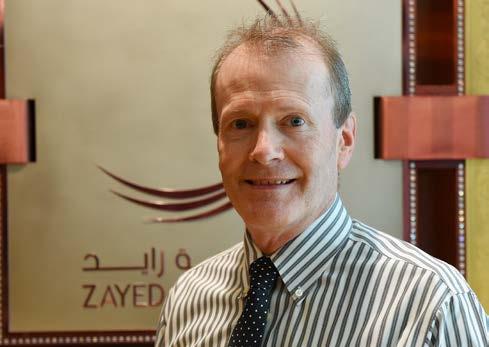
Through regular assessment in each class and an increased emphasis on projects, we achieve two primary objectives. Firstly, we are better equipped to gauge students’ progress by customizing classes to address their academic requirements, thereby ensuring structured learning. Secondly, our assessments are designed to cultivate the skills that employers actively seek, such as communication, teamwork and problem-solving.
During classes, students undergo evaluation using a variety of interactive tools, including polls, breakout sessions, and focused activities like concept mapping and debates.
Is ZU using AI to gauge the learning environment at the university?

At ZU, we embrace any smart learning tools that enhance the quality of education for our students. Our online learning platform, for instance, empowers faculty to gauge individual student participation duration during classes, allowing them to engage those who have been quieter, thus fostering their expression of ideas.
Generative AI tools, including ChatGPT, offer numerous prospects within the field of education. We firmly reject the notion of prohibiting these tools, as it would be akin to forbidding a mathematics student from using a calculator. As educators, our duty lies in continuously acquainting
ourselves with emerging technologies and ingeniously integrating them into our educational practices. Our students are preparing to step into a professional realm where AI tools are extensively employed. Thus, our role is to equip them for this future.
While AI’s role in education is in its nascent stage, we embrace its potential. The Zai Centre at ZU, a dedicated research facility focused on Arabic language instruction, has pioneered a diagnostic tool named SARD. This tool facilitates swift and effortless assessment of a young individual’s grasp of the Arabic language. Its implementation across schools in the UAE is imminent.
How does ZU’s unique Partner Challenge Program work?
This mandatory program is an exciting innovation introduced at ZU for all students pursuing our new degrees. It entails student teams collaborating to solve industry problems assigned by mentors. Throughout a semester, these teams work on developing effective solutions, benefiting from regular check-ins with mentors and support from ZU advisers.
This program provides students with a real-world glimpse into their future careers and promotes interdisciplinary collaboration among students. The program’s success is evident through partnerships with nearly 100 esteemed organizations such as Accenture, CNBC, Cisco and the Department of Culture and Tourism.
How do you envision the future of work?
This poses the million-dollar question for universities: How can students be effectively prepared for an ever-evolving labor market, especially given that market demands often outpace the development of university programs? We contend that the solution lies in equipping our students with skills resistant to disruption and fostering a mindset that welcomes challenges, novel concepts, and perpetual learning. Qualities like resilience, rapid learning and curiosity will consistently hold their worth.
31 conomy middle eastAugust 2023
Dr. Michael Allen, provost and chief academic officer, Zayed University
Is an MBA degree still the key to success in an AI-driven world?
By Soraya Beheshti
In an ever-evolving digital landscape, the MBA degree has long been regarded as a valuable passport for career advancement in the realms of business, technology and entrepreneurship. However, amid the rapid changes fueled by technology and artificial intelligence, it is natural to question whether the MBA’s relevance endures. Does it still hold its ground in the face of such transformative forces?
The resounding answer is a definite yes. In fact, the MBA might hold even greater significance today than it did in the past. As AI continues to replace an increasing number of jobs, companies are recognizing the indispensable value of soft skills, creativity, strategic thinking and a profound understanding of people and culture. In the intricate tapestry of the modern business world, employers now actively seek candidates armed with the precise skills and knowledge essential to flourish in this complex and challenging terrain.

Education
An MBA can provide the following benefits:
• A strong foundation in business fundamentals: An MBA will teach you the core concepts of business which will give you a solid foundation for your career and help make better decisions in the workplace.
• The ability to think strategically: An MBA will teach you how to think critically and solve problems. This will be essential for you to succeed in today’s fast-paced business world.
• The skills to lead and manage: An MBA will give you the skills you need to lead and manage teams. This is a valuable skill in any industry, but it is especially important in today’s collaborative and cross-functional business environment.

• A network of contacts: One of the biggest benefits of an MBA is the opportunity to network with other students, alumni and faculty. These connections can be invaluable for your career, as they can help you find job opportunities, collaborate on projects, and learn from others. If you are a business or startup owner, your MBA program can also provide you with a pool of high-quality talent to hire from.
How to choose the right MBA program
With the abundance of MBA programs available, it can be quite challenging to determine the best starting point. However, here are several essential factors to consider while selecting an MBA program:
• Your career goals: What do you want to achieve with your MBA? Do you want to change careers, advance in your current role or start your own business? Once you know your goals, you can start to narrow down your options. For instance, if you are interested in a career in tech, or if you want to learn how to use technology to transform your business, then you should look for an MBA program that has a strong tech focus. This will give you the knowledge and skills you need to succeed in the digital age.
• Your work experience: How much work experience do you have? If you have little or no experience, you may want to consider a program that offers a pre-MBA internship or fellowship. This will give you the opportunity to gain some experience before you start your MBA.
• Your budget: MBA programs can be expensive, so it’s important to factor in the cost when making your decision. There are many scholarships and financial aid options available, so don’t let the cost deter you from pursuing your MBA.
• The program’s curriculum: What are the core courses offered by the program? Do they offer any specializations that interest you? It’s important to choose a program that offers a curriculum that will help you achieve your career goals. Technology is transforming every aspect of business, from marketing and sales to operations and supply chain management. As a result, MBA graduates who have a strong understanding of technology will be in high demand. Many top MBA programs are now offering courses and specializations in areas such as data analytics, artificial intelligence and
cybersecurity. This shows that they recognize the importance of tech in the business world and are committed to providing their students with the skills they need to succeed in this field.
• The program’s faculty: Who are the faculty members at the program? What are their areas of expertise? It’s important to choose a program with faculty members who are experts in your field of interest.
The top five MBA programs
There are many great MBA programs to choose from, but here are the top five, according to the 2023 U.S. News & World Report Best Business Schools rankings:
1. Harvard Business School
2. Stanford Graduate School of Business
3. University of Pennsylvania – Wharton School
4. Columbia Business School
5. Massachusetts Institute of Technology – Sloan School of Management
These programs are all highly selective and have strong alumni networks. They also offer a rigorous curriculum that will prepare you for a successful career in business. What opportunities open professionally when you have a degree from top universities?
A degree from a top MBA program can open up a world of opportunities for you professionally. You will be able to access top jobs at leading companies, and you will have the opportunity to network with some of the most influential people in the business world.
In addition, a degree from a top MBA program will give you the skills and knowledge you need to succeed in today’s business world. You will be able to think strategically, solve problems and lead and manage teams. These are all essential skills for success in any industry.
If you’re considering an MBA, I encourage you to research the top programs and choose one with the help of a professional admissions consultant. Crimson Education has a proven track record of helping students get admitted to top MBA programs. In the past years, Crimson Education has helped over 141 students get acceptances into MBA programs and 41 of those went to the Top 10 business schools. Our alumni have also gone on to work at some of the world’s leading companies.
33 conomy middle eastAugust 2023
Soraya Beheshti, regional director, Crimson Education
a Global catalyst no more? China’s economic growth stalls amid uncertainties
According to the International Monetary Fund, this year was anticipated to be a turning point for the Chinese economy, expected to act as a global economic catalyst, as forecasted at the beginning of the year. The reopening of the Chinese economy after Beijing’s successful COVID-19 containment measures was even celebrated as the most significant economic event of the year by global financial markets. While it has indeed fulfilled some of those expectations and remains the most crucial economic event of the year, the reasons behind its significance are somewhat different.
The Chinese economy, the world’s second-largest after the United States, experienced a growth of 6.3 percent in the second quarter compared to the previous year. Although this growth rate appears impressive, it fell short of global expectations. In the second quarter, the economy only grew by 0.8 percent on a quarterly basis, significantly lower than the 2.2 percent growth rate recorded in the first quarter, amounting to an annualized rate of just 3.2 percent. Furthermore, several data points indicate a pessimistic outlook for the coming months. The slowdown in growth can be attributed to a variety

of factors, with one significant factor being China’s heavy reliance on exports. Unfortunately, the demand for Chinese goods has weakened due to the impact of higher interest rates in advanced economies. For instance, in June, China’s exports saw a staggering decrease of over 12 percent compared to the previous year, marking the largest decline since the peak of the pandemic in February 2020.
Furthermore, the Chinese economy faces another challenge in the form of reduced external demand for consumer electronics. During the pandemic, consumer electronics had been a pillar of support for Chinese industrial production, accounting for almost one-third of global industrial output.
The Economist highlights an important aspect in this context, pointing out that nominal growth in China was weaker than the inflation-adjusted figure. This has only occurred four times in the past 40 quarters, and indicates a downward trend in the prices of Chinese goods and services. In fact, during the year leading up to the second quarter, prices have declined by 1.4 percent, marking the largest drop since the global financial crisis.
conomy middle east August 2023
economy
Another obstacle is consumer confidence in China, which has been weakened since the onset of the pandemic, leading to a significant decline in retail sales and a prolonged period of decreasing new home prices, which are currently at their lowest point since records began in 2011. Moreover, the unemployment rate among Chinese graduates has surpassed 20 percent, contributing to a general sense of pessimism.
Furthermore, investment in business operations has been hampered by President Xi Jinping’s regulatory crackdown on technology companies in recent years and broader geopolitical tensions with the United States. These factors have created uncertainty and have had a noticeable impact on private investment in fixed assets, which contracted by 0.2 percent in the first six months of the year. Conversely, government-led investments saw growth of 8.1 percent, as reported by Financial Times. Additionally, real estate investment, once a major driver of the Chinese economy for almost two decades, has lost its momentum. The property market in China has not performed as expected, with apartment sales plummeting by 27 percent in June compared to the previous year.
It is crucial to note that China’s financial landscape is strained, particularly considering the soaring local government debt, which has reached approximately $9 trillion, equivalent to about half the country’s GDP. With domestic demand remaining weak, servicing such a massive debt burden could lead to escalated actual costs.
It is important to highlight that China’s main annual inflation rate was 0.4 percent in June. Concurrently, the Producer Price Index continued its decline for the ninth consecutive month in June, experiencing a significant drop of 5.4 percent compared to the previous year, marking the largest decrease since December 2015.
Mohamed El-Erian, chief economic adviser at Allianz, has identified three primary factors contributing to the recent slowdown in China’s growth. Firstly, the latest trade data indicates that the global economy is no longer providing the necessary support for China’s domestic growth dynamics. Both exports and imports declined in June, falling by 12.4 percent and 4.1 percent respectively. This can be partly attributed to major trading partners in Europe also experiencing economic slowdowns, along with enhanced restrictions imposed against China by the United States. The second factor lies in China’s dilemma in choosing between two approaches to
stimulate its economy, resulting in an indecisive policy response. This comes at a time when local political challenges are exacerbating due to structural factors, such as an aging population and rising youth unemployment. The third and final factor is that the easing of strict restrictions imposed by Beijing to combat the pandemic did not lead to widespread surges in demand for businesses and real estate.
El-Erian further emphasizes that China cannot solely rely on globalization to rescue its faltering growth model. Instead, he proposes that Beijing should focus inward and reorient its policies towards an efficient growth model. The Chinese government is responsible for the economic slowdown. Financial Times points out that years of relying on an investment-driven growth model have hindered China’s transition toward a consumer-based economy. Inadequate supervision of the housing market has led to unsustainable lending practices, while political obstacles have hindered private companies. Strict COVID restrictions have also left lasting impacts.
To prevent a debilitating contraction cycle from becoming entrenched, the government needs to take swift action and provide clear regulatory guidance for businesses. Beijing must also undertake a restructuring of its local government debt, and one option might involve selling state assets to private companies. The revenues from such sales could help local authorities avoid a debt crisis, as reported by the Financial Times.
Despite this less optimistic outlook, most analysts expect the Chinese economy to grow above 5 percent this year, which means China will continue to lead the global economy, while the economies of the United States and Europe slow down.

35 conomy middle eastAugust 2023
Region's strong economic performance attracts major investment banks
Opportunities abound amid global challenges
Wealth management across the globe has been grappling with numerous challenges amid the uncertainties affecting the world. However, the banking services in the Middle East, particularly in the Gulf region, are experiencing a renaissance as they witness a resurgence in business activity.
The Gulf region has become a magnet for private foreign investment banks, seeking to capitalize on the current market opportunities, particularly in Sukuk issuances. With ongoing structural reforms, a surge in foreign direct investments, a thriving debt and capital market, and the initiation of major projects, the economic fundamentals are gaining strength. These favorable factors present abundant business opportunities for investment banks to explore and capitalize on.

According to S&P Global Ratings’ estimates, the total global issuance of Sukuk bonds is expected to range between $160 billion and $170 billion this year, surpassing their earlier projection of $150 billion. Notably, S&P has identified several Gulf issuers that are ready and eagerly awaiting the opportune moment to launch their Sukuk offerings.
As a result, numerous major global lenders have decided to establish a foothold in the region by setting up branches, with Dubai and Riyadh emerging as the most common destinations. Their objective is to secure a pivotal role in the upcoming phase, recognizing that the region holds immense significance for any private bank aiming to advance their operations. Concurrently, governments are listing their subsidiaries on local
financial markets or divesting portions of them, while private companies are issuing large Sukuk offerings that exceed expectations.
A report by the Kuwait Financial Center, also known as MARKAZ, reveals that the stock markets in the Gulf Cooperation Council countries successfully raised $3.5 billion through 12 initial public offerings during the first quarter of 2023, with the United Arab Emirates contributing a substantial 91 percent of the total amount raised.
According to a recent report by Ernst & Young on global IPO trends, Abu Dhabi emerged as a significant player in the first quarter of 2023, with its listed companies accounting for 14 percent of the total worldwide. The UAE stock markets experienced substantial growth during the same
banking
finance
&
period, attracting over $3 billion in listing proceeds and securing the third position globally.
PricewaterhouseCoopers has identified Saudi Arabia as an attractive market for global companies seeking merger and acquisition opportunities. This is primarily due to Saudi Arabia’s ambitious goals set forth by Vision 2030, coupled with the government’s increased focus on enhancing the private sector.
The Kingdom aims to further boost the private sector’s contribution to its economy to 65 percent by the 2040s, highlighting its commitment to economic diversification and development.
Furthermore, Egypt has taken significant steps toward bolstering the role of its private sector and attracting foreign investment.
The government recently finalized contracts to sell state-owned assets worth $1.9 billion through a government-led IPO program.
To address the demands of the International Monetary Fund and secure a $3 billion loan approval in December, the Egyptian government announced its plan earlier this year to sell stakes in 32 state-owned companies to private sector investors. Notably, Egypt successfully tapped into the Sukuk market for the first time, issuing its inaugural sovereign Islamic Sukuk with a value of $1.5 billion in February of the previous year. The offering garnered significant interest, with the subscription value reaching approximately $6.1 billion, reflecting an oversubscription rate of over four times.
The Middle East experienced a substantial surge in IPOs in 2022, raising over $23 billion in total value – the highest figure since 2019 when Saudi Aramco’s IPO made history by raising $29 billion.
S&P forecasts continued momentum in the foreign currency Sukuk market throughout the second half of 2023. The rating agency highlights that numerous issuers in the Gulf region are actively exploring opportunities presented by this market, aiming to
capitalize on the current favorable interest rate environment. This projection assumes that central banks have not completed their measures to combat inflation and further interest rate hikes could be looming on the horizon.
Surplus attracts investments
GCC countries celebrated a remarkable achievement in 2022, recording a surplus of 3.5 percent of their GDP, the first surplus since 2014. This development aligns with their strategic efforts to diversify their economies, reducing their dependence on oil. The recent surge in oil prices has played a significant role in strengthening their financial reserves and providing funds for their economic diversification initiatives.
Among the GCC nations, Saudi Arabia stood out with an impressive growth rate of 8.7 percent in 2022, making it the fastest-growing economy among G20 countries. Likewise, the UAE experienced substantial GDP growth of approximately 7.6 percent, marking the highest growth rate in 11 years. Despite facing global economic challenges, the region has managed to sustain its growth momentum. The IMF forecasts a growth rate of 2.9 percent for the Middle East and North Africa region in 2023, with further expansion expected to reach 3.5 percent in 2024. This positive economic outlook positions the Middle East as an attractive destination for investments. The region has emerged as a bright spot for IPOs, as witnessed last year, and this trend continues. Notably, several companies have been listed on the stock exchanges of Saudi Arabia and the UAE during the first half of this year.
The GCC economies have shown resilience in recovering from the economic slowdown caused by the COVID-19 pandemic. This rebound can be attributed to effective government stimulus measures, ongoing spending on infrastructure projects, and significant developments that have boosted economic activity.
Bank of America acknowledges the sustained interest of foreign investors in Middle Eastern IPOs. While they anticipate a positive trajectory, they do not expect a massive surge in the second half of this year. Instead, many operations are likely to occur early or mid-next year.
Moreover, companies in the Middle East display optimism regarding the regional structural transformation. This entails a commitment to developing and uplifting capital markets, supported by financial backing from local entities.
Bonds and sustainability
The region is experiencing a surge in sustainability-linked Sukuk, commonly known as green Sukuk, which are tied to renewable energy and other environmentally friendly assets, alongside traditional bonds. Among the Gulf countries, there is a promising potential for green Sukuk in solar energy projects, contributing to sustainable development through renewable energy sources. This particular type of Sukuk has witnessed remarkable growth recently, largely influenced by the increasing awareness of environmental, social, and governance factors among issuers. In the first half of 2023, the total volume of green Sukuk saw an impressive increase of approximately 50 percent compared to the previous year. As investor awareness and interest rise, issuers are expected to offer larger Sukuk sizes to meet the growing demand. Additionally, core Islamic finance countries are taking proactive steps to reduce their carbon footprints.
According to estimates by the Arab Monetary Fund, the overall value of green bond and Sukuk issuances from Arab countries, both by sovereign and private sectors, reached $5.5 billion in 2022. The forthcoming COP 28 conference in the UAE is anticipated to shed further light on the vast opportunities presented by Islamic finance and Sukuk in financing climate-related initiatives.
37 conomy middle eastAugust 2023
Driving innovation in the Middle East's financial industry
World’s largest retail broker eyes regional expansion
Artem Seledtsov, chief business development officer and chief sales officer at Exness, has high hopes for the company’s future in the Middle East. Seledtsov sees a landscape ripe with opportunities, poised to propel Exness to new milestones and global reach. In an exclusive conversation with Economy Middle East, Seledtsov elaborates on his strategic approach to realizing these ambitions through cutting-edge product innovation, seamless transactions and an unwavering commitment to heightened security and transparency for their clientele.
The MENA region has seen significant growth in the financial industry over the past few years. What factors have contributed to Exness’ decision to expand its operations in this region, and what opportunities do you see for the company?
The MENA region offers significant opportunities for brokers aiming to expand, diversify, and tap into untapped markets. The market’s vast scale encompasses countries with affluent economies and high-income populations, particularly the oil-rich GCC nations, boasting substantial resources. This dynamic fosters a demand for wealth management and investment services. Conversely, emerging economies like Egypt and Jordan are still in developmental stages, displaying varying degrees of economic growth. Statistics reveal that over 60 percent of the region’s adult population remains underbanked or entirely unbanked, in contrast to the U.S. and EU markets. Nevertheless, where there’s demand, supply inevitably follows.

conomy middle east August 2023
banking & finance
Remarkably, the fintech sector is already flourishing in the region, buoyed by robust government backing and fintechfriendly regulatory frameworks. This upward trajectory is poised to continue, presenting unprecedented growth prospects to expand our global presence and establish dominance within the market.
Our confidence stems from our deep liquidity, robust product lineup, and the exceptional speed and quality of our order execution, positioning us advantageously in this dynamic market.
With various financial players already established in the region, what sets Exness apart from the competition?
Exness prides itself on leading technological innovation in the financial industry. Our technology has pioneered numerous industry firsts, including instant withdrawal processing, customizable leverage up to 1:2000, no-market-impact execution, and safeguards against price gaps, slippage and spread widening.

After 15 successful years, our trading engine and superior market conditions have propelled us to a remarkable milestone – becoming the world’s largest retail broker. This achievement is underscored by our monthly trading volume exceeding $3 billion and a thriving community of over 500,000 active monthly clients.
To realize this accomplishment, substantial investments have been made in our trading engine, ensuring dependable processing of this volume at optimal pricing. We’ve also honed the user experience at the terminal level. The Exness Terminal, our exclusive trading platform, offers a contemporary and user-friendly interface enriched with highly sought-after features. Among these are one-click trading, seamless integration with trading signals from Trading Central, and a suite of trading tools and indicators from TradingView. Our commitment extends to payment versatility, with a diverse array of swift and secure options. Notably, our cryptocurrency deposit offerings continue to expand, now including USD Coin (USDC) and Tether (USDT) on both the Ethereum (ERC-20) and Tron (TRC-20) networks – the latest additions to our growing selection.
Could you elaborate on the specific developments and innovations in the financial industry that Exness aims to spearhead or introduce to the MENA region?
Exness has a clear vision for driving advancements in the MENA region’s financial landscape. We are committed to bringing even greater product innovations and streamlined transactions, and ensuring greater security and transparency for traders.
Moreover, we aim to lead the way in incorporating generative AI and AI-driven tools in the traders’ arsenal. These tools can help traders either in terms of identifying opportunities to expand their portfolio or aid them with automating their trading strategies. Our focus, of course, remains on fostering financial literacy in the region and empowering traders with the knowledge and tools they need to thrive in the markets.
The MENA region has unique cultural and regulatory dynamics. How does Exness plan to navigate these challenges while ensuring compliance and trust among its clients?
Recognizing the diversity of the MENA region, Exness is deeply committed to complying with local regulations and adapting our services to suit the specific needs of each market. We prioritize maintaining transparency and open communication with local regulators to ensure that we operate in full compliance with the region’s regulatory frameworks. Moreover, we actively engage with local communities and provide educational resources to help traders understand the risks and opportunities associated with financial markets. This approach builds trust and demonstrates our commitment to responsible trading practices.
Sustainability and responsible business practices have become crucial concerns in today’s world. As a leader in the financial industry, how does Exness integrate environmental, social, and governance (ESG) considerations into its operations, and what steps is the company taking to promote sustainability in the MENA region?
Exness views its role in the MENA region as extending beyond mere financial services provision, to that of a catalyst for both economic growth and enhanced financial inclusion. Through the provision of advanced trading tools and educational resources, our goal is to cultivate a vibrant community of well-informed investors, empowering them to engage more effectively in the global markets. Our focus on technology and innovation enables us to offer cost-effective services to a broader demographic, enhancing financial inclusion in the region. As we continue to grow in the MENA region, we envision collaborating with local stakeholders to create positive socio-economic impact and contribute to the region’s long-term prosperity.
39 conomy middle eastAugust 2023
Artem Seledtsov, chief business development officer and chief sales officer, Exness
Rethinking financial education: The road ahead for Gen Z
 By Marilyn Pinto
By Marilyn Pinto
Given the easy access to financial information nowadays and the abundance of online resources, one might expect that Gen Z would possess a higher level of financial literacy compared to previous generations. However, research shows a surprising trend – Gen Z demonstrates the lowest level of financial literacy among all preceding generations. Nevertheless, this lack of financial knowledge is not entirely unexpected. For many young individuals, financial literacy falls under the concept of ‘unconscious incompetence’; they are unaware of what they don’t know, and they fail to recognize the crucial role this skill plays in shaping their future. Similar to their
predecessors, Gen Z often stumbles through various financial decisions, learning through costly trial and error. The difference lies in the fast-paced technological advancements and the increasing complexity of the financial landscape, which significantly elevates the stakes for this generation. Unfortunately, the absence of sufficient financial education programs exacerbates the problem, leaving Gen Z woefully unprepared to comprehend and make sound financial choices. Consequently, they become susceptible to falling into the debt cycle, becoming victims of investment scams, and finding themselves at a disadvantage when it comes to building wealth.
conomy middle east August 2023
banking & finance
A series of unfortunate events
Unfortunately, it is highly unlikely that there will be any change in the current situation for several reasons. The increasing workload for Gen Z students has resulted in heightened stress levels, particularly concerning exams and entrance tests. This pressure leads them to adopt a tunnel vision, focusing solely on academic pursuits and neglecting anything beyond that narrow scope. Financial education is one area that falls outside of this tunnel vision. Since there is no immediate perceived need or benefit, it remains largely ignored. Moreover, parents, also overwhelmed by their children’s academic performance, inadvertently reinforce this tunnel vision, emphasizing the existing school curriculum over other essential life skills like financial education. Even when parents do recognize the importance of financial education, youngsters often resist the additional demands on their time and make efforts to avoid enrollment in such programs. Consequently, many parents choose not to engage in confrontational situations and opt not to fight for financial education. Schools are not likely to voluntarily incorporate financial education into their curriculum due to time, resource, and budget constraints. Even if it is included in some schools, the typical teaching approach and the relevance and relatability of the content play a crucial role in determining its effectiveness. Unfortunately, most programs fall short in these aspects, leading to minimal impact on students’ lives. Regrettably, financial education faces yet another missed opportunity to make a significant difference in the lives of young individuals as it is not being implemented in a manner that aligns with its intended purpose.
Big red flag
Across the globe, a growing number of financial institutions and fintech companies are trying to address the significant gap in financial
education. However, a concerning conflict of interest arises as Gen Z finds themselves receiving financial education from the very entities they should be approaching with skepticism. This raises a big red flag. Moreover, the actual effectiveness of these efforts is questionable. It’s hard to believe that a couple of mundane student guides and uninspiring PowerPoint slides, accompanied by a patronizing voiceover on a website’s ‘Financial Education’ tab, would have any meaningful impact on changing the financial behavior and mindset of young individuals. Are they expecting these youngsters to dedicate their precious time from their already busy and engaging lives to listen to a monotonous lecture on compound interest? It’s highly unlikely. The lack of accountability, interaction, and rapport in these educational initiatives hardly constitutes a magic formula for effective and lasting change in the younger generation’s financial habits and understanding.
A significant number of their posts are sponsored by financial companies promoting products they may not fully understand – a familiar red flag. Even when their content isn’t sponsored, they quickly add a disclaimer that their advice isn’t financial in nature. This raises concerns about the reliability of their information.
Regrettably, the rest of the world mostly remains passive, excusing the approach as the best way to engage youngsters with short attention spans. But what they fail to consider is that many of these ‘finfluencers’ lack proper training and aren’t subject to any regulations. Consequently, they might not be the most suitable role models for young people seeking financial guidance.
The way ahead
Financial literacy is a multifaceted and deeply rooted issue that cannot be effectively solved by any single entity. At KFI GLOBAL, we understand the importance of addressing this challenge, which is why we proudly introduce Fin-Ed UNITED 2023—a nationwide campaign designed to promote financial literacy among the next generation through a scalable, standardized and sustainable approach.

Fin-Ed UNITED 2023 is the result of a collaborative effort by various stakeholders who recognize the numerous benefits of financial literacy for individuals, society and the nation as a whole. Educational institutions, educational authorities, government bodies, financial institutions, and other corporate entities have all come together, driven by their shared commitment to shaping a prosperous future for the next generation.
Finfluencers
Nowadays, influencers on social media claim to educate the younger generation about finances through their flashy Instagram reels and snappy TikTok videos. However, their impact isn’t always positive.
By pooling our resources, sharing expertise, and leveraging extensive networks, we aim to revolutionize financial education for the next generation and drive social sustainability. Together, we believe in creating a more financially empowered and secure society for the betterment of us all.
41 conomy middle eastAugust 2023
Marilyn Pinto, Founder, KFI Global
Use
of VR in the classroom has become a reality at INSEAD
School embarks on collaborative exploration of integrating VR into K12 education in Abu Dhabi
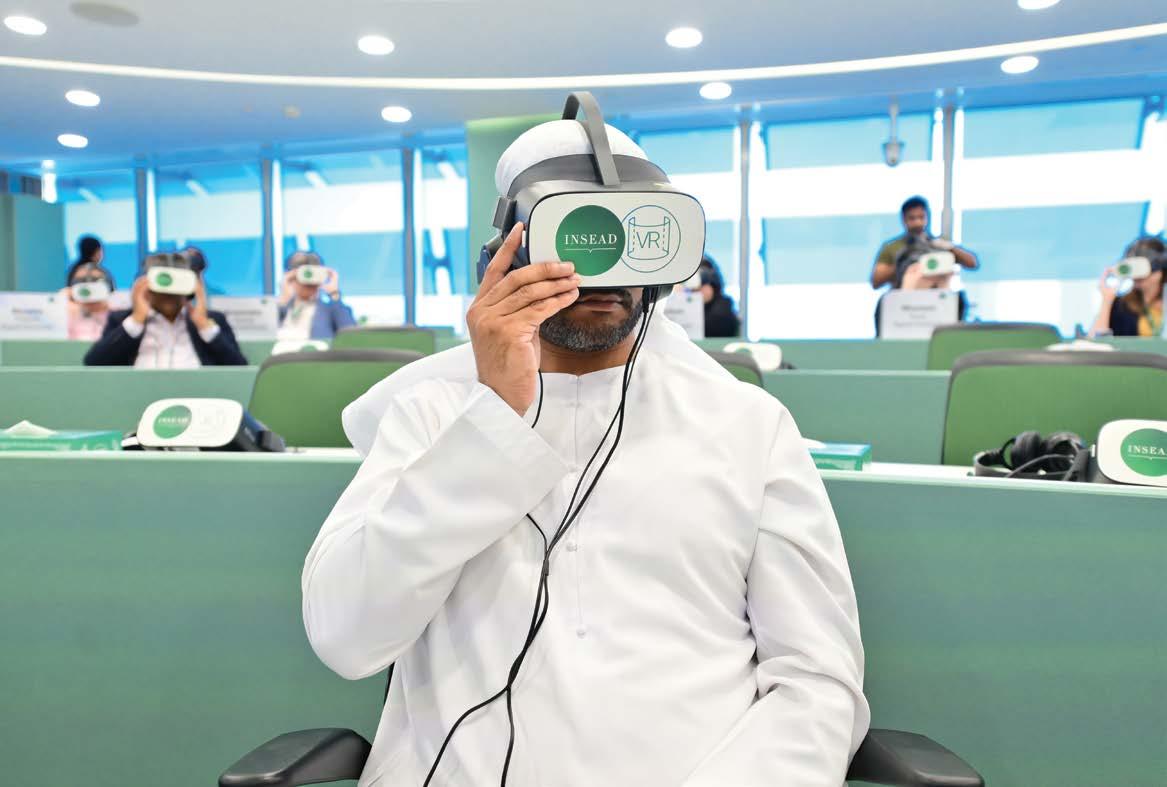
INSEAD, recognizing the Middle East’s tremendous potential as a hub for innovation and entrepreneurship, has been at the forefront of integrating Virtual Reality (VR) teaching and learning into its educational approach. Through this pioneering effort, the school aims to offer students faster learning, enhanced information retention, and the opportunity to actively engage in solving challenging and complex problems.
A significant milestone in this endeavor is the creation of the world’s largest VR library for management education, which boasts an impressive collection of 20 VR Immersive Learning Experiences. In line with its commitment to fostering a global community interested in immersive experiences and sharing best practices, INSEAD hosts the Global XR Management Community. This initiative seeks to encourage and facilitate vibrant discussions and collaboration among individuals from all over the world.
To shed light on the various aspects of INSEAD’s innovative initiatives and programs, Economy Middle East conducted an insightful interview with Ithai Stern, Associate Professor of Strategy and Academic Director of the VR Immersive Learning Initiative at INSEAD.
conomy middle east August 2023
technology &
Innovation
What were the top three takeaways offered by academics and scholars in the first annual meeting of the global XR management community in early June?

The INSEAD Immersive Learning Initiative, situated at the INSEAD Middle East Campus in Abu Dhabi and supported by the Abu Dhabi Department of Education and Knowledge (ADEK), embodies a cutting-edge and forward-thinking approach to education.
With 42 scholars from 24 global institutions presenting at the meeting, our objective was to foster a community of scholars who are already leveraging new technologies in their teaching and research. The meeting yielded three pivotal insights:
Firstly, an increasing number of schools have begun exploring the use of Virtual Reality (VR) in management education. Through our gathering, we successfully generated momentum to expand the adoption of immersive learning experiences in educational institutions worldwide.
Secondly, INSEAD has developed a comprehensive solution to enable schools across the globe to integrate VR into their curricula. Our institution has created a supportive ecosystem that complements VR integration, achieved through a synergy of four core capabilities: academic content development, production, a robust technology platform, and efficient device operations. As a result, other schools can easily access and utilize VR resources from INSEAD’s library while also leveraging the platform to distribute their own VR content. Lastly, the meeting featured 17 research presentations centered around VR and its applications for research purposes—an emerging method that is garnering significant attention.
What are some of INSEAD’s educational milestones over the past 10 years that helped shape and empower students in meeting today’s business and technology needs in an evolving digital landscape?
INSEAD has consistently spearheaded innovation in the field of education. Over the past decade, the school has taken significant strides to address the changing demands of business and technology in the digital era, exemplified by the establishment of the INSEAD Immersive Learning Initiative. In addition, the INSEAD faculty conduct leading research and publish cases on various aspects of digital transformation, including technological advancements, digital strategy, innovation, and the implications of digital disruption on different industries. They contribute to a deeper understanding of the digital landscape and its impact on businesses. In March this year, the school launched the INSEAD Learning Hub, reinventing lifelong learning with an innovative subscription-based mobile app. It provides a remarkably engaging educational journey, offering the latest and most relevant insights from world-renowned faculty, industry
experts, and leading organizations. This platform enables individuals to embark on a personalized and self-driven learning adventure via a mobile app, accessible anytime and anywhere.
How are VR and XR transforming learning at INSEAD, and is your partnership with ADEK based on transferring that learning strategy onto K-12 curricula?
Using VR technology at INSEAD has become a remarkable reality. During the last academic year, over 5,000 learners at INSEAD actively engaged with VR, and currently, 40 professors are either integrating VR into their teaching methods or contributing to the development of immersive learning experiences using VR technology. This has significantly set INSEAD apart from other institutions.
Our primary focus remains on higher education. To make a positive impact on Abu Dhabi’s higher education ecosystem, we have extended our support to three universities in piloting VR within their classrooms: Zayed University, UAE University, and Sorbonne University Abu Dhabi. The results of these pilot initiatives have been overwhelmingly successful, leading to the formalization of our partnerships through MOUs with both UAE University and Sorbonne University Abu Dhabi. Furthermore, realizing the importance of nurturing business skills from an early stage, we collaborated to explore introducing VR into K12 education in the capital. This joint effort was bolstered by two highly successful pilot initiatives conducted within geography classes at the German International School Abu Dhabi.
Building on these achievements and with ADEK (Abu Dhabi Department of Education and Knowledge) playing a key role in technology education, we recognize the significance of empowering students with the skills needed for future jobs. Thus, we have joined forces to pave the way for enhanced immersive and integrative learning experiences. Currently, we are actively exploring avenues to introduce this innovative method more broadly across schools in Abu Dhabi and adapt the teaching notes and playbooks to suit the specific context of K12 education.
Can you prioritize the initiatives that INSEAD is engaged in or launching in the region to identify and address business challenges? What are some of these challenges?
The pace of change in the business world is continuously accelerating, necessitating the constant updating and enhancement of people’s skills and competences. For business schools like INSEAD, it becomes crucial to devise innovative approaches that maximize the return on investments in training and education while minimizing the time required. The Immersive Learning Initiative, introduced at the ME campus in 2020, plays a pivotal role for INSEAD in achieving this goal.
43 conomy middle eastAugust 2023
Ithai Stern, associate professor of strategy and academic director, VR immersive learning initiative, INSEAD
The right to proper education and dispute resolution in the
UAE
Understanding the legal aspects of education rights
 By Maroun Abou Harb
By Maroun Abou Harb
Education is an essential and fundamental right for every child, and parents have the right to ensure their children receive a proper education within a safe and nurturing environment. Recognizing the importance of this right, the United Nations has taken steps to protect and uphold education as a basic and core right for individuals worldwide. In this article, we will delve into the legal aspects concerning education in the UAE, including the right to education, oversight committees, dispute resolution, students’ rights, and the available legal recourse in case of incidents.
Legal review
The right to proper education and disputes
The right to education is firmly protected under Article 16 of the UAE Constitution, reflecting the nation’s steadfast commitment to providing free education at all levels and enforcing compulsory primary education. The UAE’s legal framework places significant emphasis on ensuring the highest quality of education, and parents have the right to ensure that their children receive an education that meets the prescribed standards. Should any concerns arise regarding the standard of education, curriculum, teaching methods, or facilities, parents have recourse to Chapter 7 of Federal Law No. 3 of 2016 on “Child’s Rights”. This law not only upholds children’s right to education but also establishes mechanisms for resolving disputes concerning the welfare of children.
Governmental and private sector oversight committees
The Ministry of Education in the UAE plays a pivotal role in overseeing the educational system and implementing policies to improve the quality of education. It conducts regular inspections of schools to assess their adherence to regulations, teacher qualifications, and curriculum standards. In addition to this, the Commission for Academic Accreditation in the UAE ensures that educational institutions uphold high standards and fulfill accreditation requirements. Rigorous oversight also extends to private schools in the UAE. The Knowledge and Human Development Authority oversees private schools in Dubai, while similar educational authorities exist in other emirates. These organizations consistently evaluate schools’ performance and conduct inspections to ensure a commitment to maintaining educational excellence.
Rights of parents and students in disputes
UAE law provides various avenues for parents and students to address disputes related to education. Parents can raise concerns with the school’s management or escalate issues to the relevant educational authorities. If disputes remain unresolved, they have the right to seek mediation or legal assistance to address the matter formally.
Moreover, the UAE Cybercrime Law (Federal Law No. 34 of 2021) plays a crucial role in safeguarding students and parents from online abuse and harassment, particularly addressing cyberbullying within the educational sphere.
Rulings against bullying and sexual misconduct
Bullying and sexual misconduct are treated with utmost gravity under UAE law. Educational institutions are obligated to establish comprehensive anti-bullying policies, and their faculty and staff undergo specialized training to identify and address such behavior. In the event of any bullying incidents, schools are required to conduct prompt investigations and apply appropriate disciplinary measures against the wrongdoers.
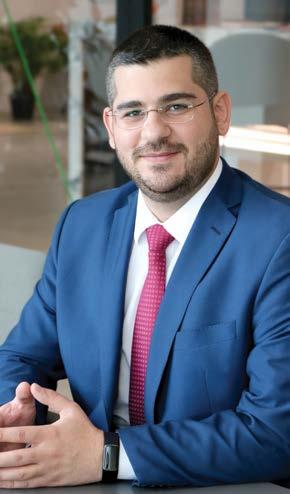
Sexual misconduct, particularly involving minors, is regarded as a serious criminal offense according to UAE law. Perpetrators can be subjected to severe penalties, such as imprisonment and fines. In order to prevent and respond to cases of sexual misconduct, schools are compelled to enforce stringent child protection policies.
Legal recourse for lack of security measures
The UAE places great importance on the safety and security of students. If an incident occurs due to the lack of proper security measures, parents have the right to seek legal recourse against the school or relevant authorities for negligence. The UAE Civil Transactions Law imposes a duty of care on educational institutions to ensure the safety of their students. In case of any harm caused due to a breach of this duty, parents can pursue legal action to claim compensation for damages.
Mandated preparedness for emergencies
UAE law mandates that educational institutions maintain comprehensive emergency preparedness plans to handle a range of potential crises, such as fires, storms, earthquakes and other hazards. Schools are required to conduct regular drills, enabling students and staff to practice appropriate responses in various emergency scenarios.
Moreover, local civil defense authorities play a vital role in collaborating with educational institutions to ensure that schools meet all necessary safety standards and implement appropriate measures to safeguard students during emergencies.
In the UAE, education is not only a fundamental right protected by law but also enshrined in the Constitution. Parents have the right to ensure their children receive a proper education, which is monitored and maintained by various oversight committees in both government and private schools. The UAE’s laws take a firm stance on critical issues such as bullying, sexual misconduct, and negligence concerning students’ safety. With these robust legal protections in place, parents can have peace of mind, knowing that their children are provided with a safe and enriching educational experience in the UAE.
45 conomy middle eastAugust 2023
Maroun Abou Harb, associate, BSA
Impact of design on learning experiences
Student-centric environments can influence performance

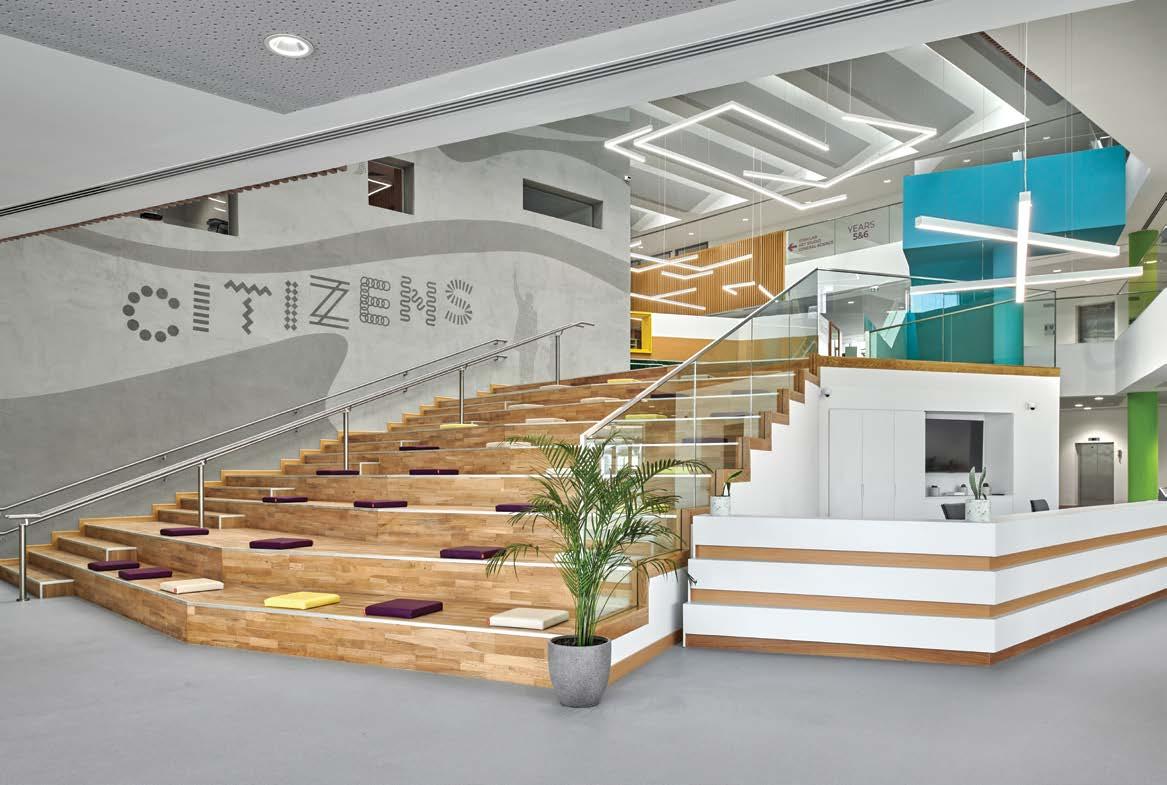 By Jason Burnside
By Jason Burnside
The importance of the immediate environment on a child’s ability to learn and create has reached a greater understanding than ever before. A conducive environment can significantly enhance the quality of learning and foster a sense of pride, confidence and curiosity. At its most basic level, a school should ensure good ventilation, reliable acoustics and bright airy spaces flooded with natural daylight. Equally important, however, is the impact of comfort, flexibility and enjoyment on the wellbeing of both students and teachers.
conomy middle east August 2023
Real Estate
ISG School
Citizens School reception
Creating engaging spaces
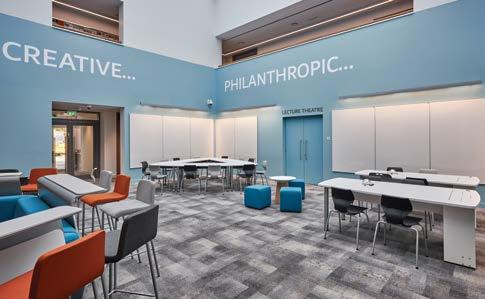
There is a significant shift toward social spaces, blending hospitality, office and university references to create engaging environments. Learning is no longer confined to classrooms, as it spills out into communal areas and outdoor spaces, becoming focal points in school design. These spaces provide opportunities for students to meet, gather and engage in discussions or find a quiet area to work. They cater to classroom study needs and also offer areas for students during free periods who simply want a place to sit down and revise. The design is less rigid, promoting self-directed learning under the indirect observation of teachers.
Looking at how children do their homework at home, they often use laptops or tablets while comfortably seated on a sofa or chair. To replicate this comfort within the learning environment, flexible furniture and social spaces have replaced the rigid setup of a single desk and chair. The boundaries between formal structured learning in a classroom and incidental spaces are blurred, allowing students to choose the setting that best suits their needs at any given time.
Modern schools are designed to instill trust. By providing comfortable spaces where students can focus on their schoolwork, teachers demonstrate their confidence in the students’ ability to manage their time effectively. This approach also parallels students’ future working lives, as they will be expected to use spaces to study or work on projects with specific deadlines. Learning to manage time and deliver expected outcomes is an essential skill for their future success.
Students’ learning journeys
We need to consider the child’s journey from early years learning through senior school and design schools in a way that provides a sense of familiarity, easing their transition through to middle school and eventually to senior school. In the early years, classroom scale is determined by age groups, which also define the placement and sizes of various elements in teaching rooms. To encourage flow and avoid inhibitory barriers, we keep walls and adjoining facilities to a minimum. Additionally, we create innovative learning and social spaces within the building’s nooks and corners to facilitate interaction or quiet time.
Early years learning focuses on providing spaces for children to discover and explore, which should be taken
into account as they progress to middle school. Visual reference points, color, and finishes throughout the school aid in easy movement and wayfinding.
As they move up to senior school, the design is focused on unconventional spaces to foster creative and collaborative thinking. Incorporating whiteboards and movable seating encourages students to gather and work together on projects or shared problems. This not only nurtures their confidence but also prepares them for the working world, teaching them the value of teamwork.
There are numerous advantages to building a primary and secondary school on the same campus. Apart from the efficiency of shared facilities like a swimming pool and playing field, the proximity and shared resources help students transition from primary to secondary education, building their confidence for the next stage of their academic journey.
Architecture is key
The role of architecture within this journey is to ensure that each key development stage is respected and that the design is student-centric, tailored to the specific needs of students at every stage of their education.
Similar to how hotels today cater to the needs of younger travelers, schools are also recognizing the significance of social spaces within their buildings. These spaces are not treated as an afterthought tucked away in a gloomy corner but are integral to the overall design of the building. These fluid learning environments can be easily adapted to meet the unique requirements of students, whether it’s for group discussions, quiet study or various activities. Moreover, they are versatile enough to accommodate assemblies, events and local productions, with some designs even featuring the café prominently in the entry atrium space. Today, the spaces within schools have evolved into defining elements that represent the school’s brand and values. While it is impossible to predict all future changes, efforts are made to future-proof the design as much as possible, ensuring that the school and its spaces remain flexible enough to accommodate potential revisions and adaptations.

47 conomy middle eastAugust 2023
Jason Burnside, managing director, Godwin Austen Johnson
Dubai College D block
What tomorrow holds
By Antonio Pietri
Last year, COP27 was hailed as the “implementation COP” – a gathering of the global community focusing on concrete steps to achieve a sustainable future. In less than six months, COP28 will take place in Dubai, marking a pivotal moment that demands a concerted effort for transitioning to a low – or nocarbon economy.

As COP28 President-Designate Dr. Sultan Ahmed Al Jaber stated at UAE Climate Week, “We need to reimagine the relationship between energy producers and industrial consumers, from one based purely on supply and demand to one that is focused on co-creating the future. We must create an active partnership between the largest producers of energy, the biggest industrial consumers, technology companies, the finance community, governments and civil society. Working together, the goal would be an accelerated, practical and just energy transition that leaves no one behind, particularly across the global south. In short, our goal must be to hold back emissions, not progress.”
For asset-intensive industries, two key questions need addressing: How are companies handling the challenge of meeting rising energy and resource demands while ensuring sustainable operations? And what steps are they currently taking to navigate the energy transition? To achieve global sustainability goals, innovation must span the entire value chain, encompassing new business models, go-to-market strategies, collaboration and co-innovation approaches. In the short term, digital technologies are instrumental in delivering significant sustainability benefits. Measures like advanced process controls, digital twin modeling, and supply chain management help companies maximize efficiency from existing assets while minimizing emissions. Furthermore, various technologies offer benefits that extend beyond efficiency improvements. Advanced modeling and simulation tools enable companies to test and identify the most efficient, cost-effective and scalable processes before making substantial capital investments. Additionally, easy-to-implement
conomy middle east August 2023
Sustainability
sustainability models can accelerate efforts across different sustainability targets, including emissions management and renewable energy adoption, among others.
In other cases, AI-driven maintenance solutions can help companies predict breakdowns before they happen, avoiding costly downtime and emissions associated with emergency shutdowns. Digital supply chain solutions maintain a steady supply of raw materials while reducing Scope 3 emissions, and digital grid management software simplifies integrating renewable energy into energy supplies. A growing number of companies are exploring new technology options. According to Bloomberg NEF, global investment in low-carbon technologies reached $755 billion in 2021, with spending on carbon capture more than doubling from 2022 to 2023, reaching a record $6.4 billion. Biofuels and the hydrogen economy have seen similar increases – an IEA report indicated biofuel investment surpassed $8 billion in 2021, while a World Bank study predicted the hydrogen production market would grow by over 9 percent through 2030. The electrification market has also experienced significant growth, reaching $73.6 billion in 2022, as companies increasingly turn to renewable sources of power to reduce their carbon footprint. Going forward, this trend is expected to continue, reaching a market value of nearly $174 billion by 2032, according to a Precedence Research study.
As these technologies continue to grow, digital simulation tools and systems-level risk modeling will play key roles in their development, allowing organizations to evaluate different processing options and identify the most economically feasible solutions. While digital technology will remain vital for value creation, it is also critical for reaching sustainability goals, and must be accompanied by new ways of doing business. In the Middle East, companies like Aramco have already begun pursuing these innovations.

Working in collaboration with the Korea Advanced Institute of Science and Technology, the company developed new technology last year that optimizes carbon capture and utilization (CCU) with the goal of accelerating CCU system adoption. At the heart of the system is an algorithm that analyzes the economics, process design, operations constraints, and CO2 reduction achieved with different carbon capture technologies, allowing companies to identify and implement the most promising approaches.
To bring the technology to the market, Aramco took a unique approach by licensing it to an industrial software company as part of an integrated modeling and optimization solution. This approach enables asset-intensive industries to develop practical and economic carbon capture solutions.
International companies like Aramco, however, are not alone in seeking new business opportunities. Sustainability-focused startups have attracted billions in investor funding, with over €8.8 billion invested in European sustainability startups in 2021 alone, and even more invested worldwide.
Along with new business models and co-innovation strategies, companies must also focus on achieving organizational excellence by investing in talent, developing training programs, and establishing best practices. The goal is to attract and retain highly skilled workers.
As the workforce undergoes rapid change in the coming years, building these internal competencies and skills will be critical to ensure employees and organizations can effectively adopt new technologies and adapt to emerging business models. These adaptations will play a significant role in driving both profitability and sustainability in the future. Asset-intensive industries are vital components of modern life. Remaking them for a sustainable future won’t be easy or happen overnight; it demands dedication, creativity, and a willingness to push the boundaries of technology and business.
As we look ahead to COP28, the world faces a distinct opportunity – a chance for us to collaborate and discover innovative ways to create a sustainable future that benefits everyone.
I look forward to the emergence of these innovations and am eager to see what tomorrow holds.
49 conomy middle eastAugust 2023
Antonio Pietri, president and CEO, Aspen Technology
Empowering students to transform the environment: Ethical journeys with impact
 By Stuart Rees Jones
By Stuart Rees Jones
In today’s world, it is crucial to equip younger generations with the skills, knowledge, and empathy needed to address environmental challenges. Ethical Journeys with Impact, an innovative approach spearheaded by an organization committed to environmental stewardship, reshapes perceptions and empowers students, schools, and parents. Camps International is nurturing a new generation of environmentally conscious individuals by providing expeditions that focus on ecological stresses and biodiversity.
Redefining educational expeditions
These expeditions revolutionize educational experiences, traditionally detached from the natural world, by offering a fresh perspective and striving to immerse students in meaningful interactions within natural environments. This fosters a deep appreciation for the beauty and interconnectedness of the ecosystem. Through handson activities like reforestation, wildlife conservation, and sustainable development projects, students gain a profound understanding of the environmental challenges we face. Research consistently highlights the myriad benefits of out-of-school learning experiences, such as expeditions,
for students. Numerous studies have demonstrated that these immersive activities profoundly impact students’ cognitive, social, and emotional development. Participating in expeditions fosters critical thinking, problem-solving skills, and a deeper understanding of complex ecological systems. Moreover, research indicates that out-ofschool learning promotes increased self-confidence, resilience, and a sense of personal responsibility towards the environment. By stepping outside the confines of traditional classrooms and engaging in real-world experiences, students gain a unique perspective that broadens their horizons and nurtures a lifelong passion for environmental conservation.
conomy middle east August 2023 Sustainability
Transforming perceptions about the environment
Many students embark on these expeditions with limited exposure to the fragility of ecosystems and their connection to human actions. However, through immersive experiences, they witness the consequences of deforestation, habitat loss, and pollution. This encounter compels students to re-evaluate their behaviors and become catalysts for change within their communities, reshaping environmental perceptions.
Skills and knowledge for environmental resilience
Student expeditions and volunteering are not merely about inspiring awareness; they also equip participants with practical skills and knowledge to address environmental challenges. Through expert guidance and hands-on training, students gain an understanding of sustainable practices, ecosystem management, and the significance of biodiversity. These skills extend beyond the expeditions, empowering students to enact real change in their local communities.
As a social enterprise dedicated to the environmental cause, Camps International plays a crucial role in raising awareness about environmental challenges and the importance of resilience. Their educational programs, known as “Real World Studies,” serve as an additional resource for children to prepare for their on-ground experiences during expeditions and enable them to collaborate with local communities to promote environmental literacy. By empowering individuals with knowledge and skills, such enterprises foster a culture of environmental stewardship among both youth and adults alike.
Addressing ecological and biodiversity stresses

Recognizing the urgency of environmental stewardship, expeditions help students engage in reforestation projects, research, and collaboration with local communities. Through these initiatives, students contribute to preserving and restoring fragile ecosystems. Beyond conservation efforts, these experiences help improve cross-cultural understanding and global citizenship. By immersing students in diverse cultures and communities, these journeys enable participants to appreciate the interconnectedness of environmental, social, and economic factors. This holistic approach solidifies their commitment to sustainable practices and responsible decision-making.
Empowering Gen Z: Nurturing empathy and self-confidence
The younger Gen Z-ers have garnered significant attention for their commitment to addressing social issues directly. Their refusal to accept passive ignorance has demonstrated the power of speaking up for peers and advocating for those who cannot. Young adults gain empathy through engaging in real-life experiences and immersing themselves in local communities. Encouraging children to support those in need fosters resilience, self-awareness, and strengthens family bonds. Participating in experiences that involve helping others allows young adults to develop a genuine appreciation for their privileges. This newfound gratitude translates into a willingness to positively impact the world around them. By exposing children to these transformative experiences, parents play a vital role in nurturing empathy and shaping their children’s outlook on the planet. Acknowledging their efforts boosts their self-confidence and self-worth, reinforcing their belief in their ability to effect meaningful change. This sense of satisfaction derived from making a difference further empowers them to continue playing an active role in society.
Conclusion
Stuart Rees Jones, CEO and founder, Camps International

As parents and educators, it is crucial to support Gen Z in their quest to make a positive impact. By providing opportunities for real-life experiences and encouraging empathy, we equip young adults with the tools to navigate moral dilemmas and become compassionate leaders. We can nurture a generation that embraces social responsibility and works collaboratively towards a brighter future for all.
Ethical Journeys with Impact is driving a paradigm shift in environmental education. Camps International is nurturing a new generation of environmental leaders by empowering students to transform their perceptions, acquire practical skills, and address ecological stresses and biodiversity loss. As we confront the challenges of the 21st century, initiatives like Ethical Journeys with Impact provide hope and inspiration for a sustainable and thriving future. Let us embrace these transformative experiences and empower our youth to safeguard the planet they will inherit.
51 conomy middle eastAugust 2023
Top MBA programs in the Middle East
Wide range of options to help advance your career further
Economy Middle East presents a comprehensive list of top MBA programs in the Middle East, designed to assist young professionals in advancing their careers through the pursuit of an advanced degree in business administration. This list also caters to entrepreneurs seeking a solid understanding of various aspects of their business, ranging from accounting to operations, marketing and management.
To ensure accuracy and relevance, we collaborated with colleges and universities across the region to gather essential information. Additionally, we conducted extensive research using publicly available data. As of the current writing, all the information, including details on tuition, accreditation and rankings, is up-to-date.
It is important to note that this compilation is not an attempt to rank the MBA programs. Instead, we strive to offer transparency and clarity by presenting many of the top programs available in several countries across the Middle East. There are organizations specializing in studying these programs in-depth and providing rankings based on specific standards and metrics.
Our primary objective is to furnish a comprehensive list of MBA programs accessible in the Middle East and North Africa. We have included as much relevant information as possible to aid individuals in conducting further research on their own. Contacts for each program are also provided, enabling interested candidates to initiate communication and take the next step toward obtaining an MBA diploma.
Pursuing an MBA degree can be both challenging and rewarding, particularly in a region where leaders and governments heavily invest in attracting and nurturing top talent. As the business environment becomes increasingly competitive, possessing exceptional credentials, such as an MBA degree from a reputable institution, will undoubtedly provide a valuable edge for aspiring professionals and entrepreneurs.
52 conomy middle east August
2023
MBA list
Bahrain
American University of Bahrain
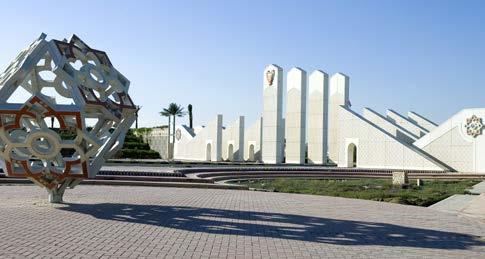
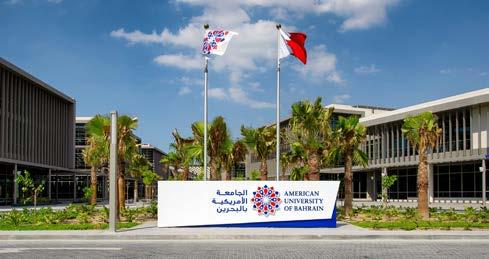
Riffa, Bahrain
www.aubh.edu.bh
registrar@aubh.edu.bh, admission@aubh.edu.bh
The advanced MBA program at American University of Bahrain, created in collaboration with California State University Northridge, offers diverse leadership opportunities and accelerates corporate careers or entrepreneurial endeavors in global markets. With its broad applicability across industries, the program focuses on current business trends, advanced management techniques, and networking skills to foster collaboration.
Relevant information
• Language: English
• Concentrations: Marketing Management & Strategy, Business Data Mining & Predictive Analytics and Global Strategic Management & Innovation
• Accreditations: Association to Advance Collegiate Schools of Business, Council for Higher Education Accreditation, Higher Education Council, WASC Senior College and University Commission
Management Development Center International
Manama, Bahrain www.mdciedu.com roberto.rice@mdciedu.com
Management Development Center International’s The Next Generation MBA is offered in partnership with the Charles Massingham Consulting Group (CMC).
Students will receive their MBA degree from the UK’s York St John University. Upon completion, graduates will also gain a professional certificate from the Chartered Management Institute (CMI) in the UK. The MBA program (with a concentration in Transformational Leadership) ensures that students stay updated and well-informed about the latest market trends, technological advancements, dynamics of global economics, and other relevant developments, helping them stay ahead in their fields.
Relevant information
• Full-time
• Language: English
• Tuition: $12,000
University College of Bahrain University of Bahrain College of Business Administration
Manama, Bahrain
www.ucb.edu.bh info@ucb.edu.bh
The University College of Bahrain offers an evening MBA program designed specifically to meet the needs of new university graduates and working professionals.
The university’s MBA program is benchmarked against international best practices and boasts faculty members who are renowned for their academic and research credentials.
The in-class experience includes numerous simulations of management processes, decision-making scenarios, extensive interaction between the faculty and students, communication and presentation skills enhancement, and team exercises. It offers a balance of core courses along with specializations in Management and Islamic Finance.
Relevant information
• Language: English
• Tuition: $21,000
• Concentrations: Management, Islamic Finance
• Highlights: UCB has signed agreements with the International Islamic University Malaysia (IIUM) and Finance Accreditation Agency (FAA)
Al Zallaq, Bahrain www.uob.edu.bh website@admin.uob.bh
University of Bahrain’s Master of Business Administration (MBA) seeks to equip graduates with the right knowledge, skills and values that can help them become leaders who will be able to successfully navigate a dynamic and globalized economy. The MBA program strives to be recognized as a leading graduate program in the region, and to meet the highest international quality standards for excellence in business education.
Relevant information
• Study mode: Full-time
• Language: English
• Concentrations: Management, Islamic Finance, Banking & Finance, Marketing & International Business, Management Information Systems (MIS)
• Accreditation: Association to Advance Collegiate Schools of Business
• Ranking: #801-1000 in QS World University Rankings 2023
53 conomy middle eastAugust 2023
University of Bahrain
American University of Bahrain
Egypt
Arab Academy for Management, Banking and Financial Sciences (AAMBFS)
Giza, Egypt
www.aambfs.org
inquiry@aambfs.org
The AAMBFS Master of Business Administration (MBA) program, in partnership with SAS®, provides specialized majors in business and finance, taught by esteemed professionals and SAS® experts in the Arab world. This program combines practical application with theoretical knowledge, empowering students to succeed in their chosen fields and pursue career advancement. The curriculum combines analytics with business to improve the skills needed to become a successful business analyst with outstanding potential for professional growth. The program consists of six different specializations; Financial Markets, Financial Management, Business Administration, Human Resources, Marketing and Banking.
Relevant information
• Study mode: Part-Time
• Languages: English, Arabic
• Duration: 16 months
Cape Breton University (CBU) in Cairo

New Cairo City, Egypt
www.mynsfuture.ca/universities-colleges/cape-breton-university registrar@cbu.ca
Cape Breton University (CBU) is a Canadian public institution situated in Sydney, Nova Scotia. It has a secondary campus in Cairo, Egypt, where an MBA program specializing in business administration is offered. CBU holds accreditation from the Maritime Provinces Higher Education Commission, and the language of instruction at its Cairo campus is English. The faculty members at CBU’s Cairo campus consist of accomplished professionals and scholars from various business fields.
Relevant information
• Language: English
• Intake: April
• Duration: 24 months
• Accreditation: Maritime Provinces Highter Education Commission
Ecole Superieure Libre Des Sciences Commerciales Appliquees
Giza, Egypt www.eslsca.fr/mba
Ivb.diploma.baseera@eslsca.edu.eg
ESLSCA Business School Paris focuses on equipping its students with strong management skills and preparing them for responsible management roles. For more than 70 years, the school has become a center of academic excellence, particularly in Finance, Management, Data, Marketing, and Logistics.
The program includes work-study options and emphasizes a progressive approach to knowledge acquisition and skill development through practical experiences, international exchanges, and partnerships with companies that provide internships and work-study opportunities.
Relevant information
• Study mode: Part-Time
• Language: English
• Intake: May
• Duration: 24 months
• Concentrations: Global Marketing, Human Resources, Global Management, Finance & Banking
• Accreditation: French Ministry of Education
Cairo, Egypt www.aucegypt.edu
Info@aucegypt.edu
The American University in Cairo’s MBA degree is a bespoke program designed for those who seek to stay at the top of their game. It seeks to empower professionals to significantly advance their careers and achieve new heights.
The MBA program provides students with a strong understanding of real-life business practices and provides you with international experiences that are crucial in maneuvering today’s dynamic and cross bordered business world.
Relevant information
• Study mode: Full-time (MBA) and part-time (EMBA)
• Language: English
• Duration: 24 months (MBA); 20 months (EMBA)
• Tuition: $30,870 (MBA); $45,000 (EMBA)
• Concentrations: Marketing, Operations Management, Management of Information Technology, Construction Industry
• Intakes: April and October (MBA); September (EMBA)
• Rankings: #4 in QS Global MBA Rankings 2023: Middle East and Africa
54 conomy middle east August 2023
The American University in Cairo (AUC)
MBA list
American University in Cairo
Al-Alhiyya Amman University
Amman Campus, Jordan www.ammanu.edu.jo Public@ammanu.edu.jo
The Al-Alhiyya Amman University MBA Program equips students with the necessary skills and knowledge to succeed in the dynamic world of business. With a focus on practical application and a distinguished faculty, the program offers a transformative learning experience for aspiring business leaders.
Relevant information
• Language: English
• Credit: 33 Hours
• Highlight: Offered in cooperation with Edinburgh Business School
Jordan Kuwait
Gulf University for Science and Technology (GUST)
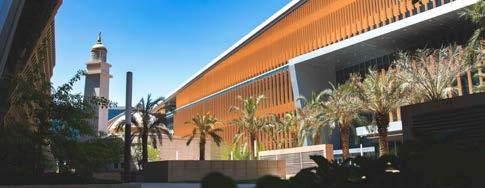
Mubarak Al-Abdullah Area/West Mishref, Kuwait www.gsr.gust.edu.kw mba@gust.edu.kw
GUST offers an MBA degree designed to meet students’ professional needs and goals. The MBA program at GUST is designed for risk-taking, challenging, and intellectuallyexperienced people. People who seek to develop and grow in their career and bring out the confident leader within them. The major learning outcomes of our MBA emphasize leadership, ethical standards, teamwork, and critical thinking. The curriculum will teach you how to use analytical outlines and tackle complex problems, which will help you progress in your career to earn your next promotion.
Throughout the program’s duration, students will experience being treated professionally with interest and responsiveness, by an approachable and collaborative faculty focused solely on developing your business and leadership skills. Our MBA program, which holds international accreditation, is specifically designed to meet every decision maker’s strategic needs.
Relevant information
• Language: English
• Duration: 24 months
• Concentrations: Accounting, Auditing, Economics, Corporate Finance, Banking, Financial Technology (FinTech), Management, Entrepreneurship, Supply Chain Analytics, Human Resources and Marketing
• Accreditation: Association to Advance Collegiate Schools of Business
University of Jordan

Amman, Jordan www.ju.edu.jo fgs@ju.edu.jo
The University of Jordan’s MBA in Business Administration aims to provide students with a comprehensive understanding of modern business administration methods. It strives to become the most esteemed program in Jordan and the Middle East, producing experts with advanced academic and research expertise who can effectively lead in business organizations. The program’s mission is to offer exceptional education and research methods, fostering continuous excellence among academic staff and students, while equipping students with the essential knowledge in basic and advanced business administration. Relevant information
• Language: English
• Duration: 24 months
• Tuition: $13,500
• Concentrations: Production and Operations Management, Managerial Accounting, Financial Management, Marketing Management, Applied Statistics in Business Administration, Organizational Behavior, Strategic Management
Kuwait University
Safat, Kuwait ww.kuweb.ku.edu.kw shaimaa@cba.edu.kw, i@ku.edu.kw, mona.arian@ku.edu.kw
The College of Business Administration provides an MBA program that equips students with the necessary skills to excel as competent leaders and managers, catering to the demands of both the private and public sectors. The program accepts applicants with undergraduate degrees in both business and non-business fields, offering flexible options for full-time and part-time study, with English as the primary language of instruction.
Relevant information
• Language: English
• Intake: January
• Concentrations: Management, Accounting, Finance
• Accreditation: Association to Advance Collegiate Schools of Busines• Rankings: #851-900 in QS World University Rankings 2023, #201-250 Universities in Asia 2023, Times Higher Education
55 conomy middle eastAugust 2023
Al Alhiyya Amman University
Kuwait University
Lebanon
American University of Beirut (AUB)Suliman S. Olayan School of Business (OSB)

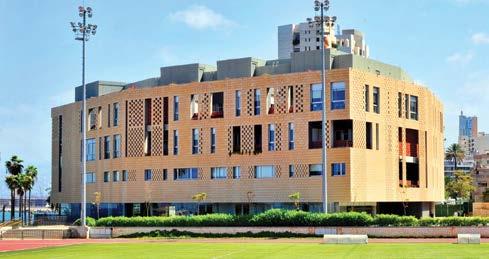
Beirut, Lebanon
aub.edu.lb
Osb@aub.edu.lb
The most important and cutting-edge business experts and thinkers visit our campus to speak to, instruct, and mentor students in our MBA program in American University of Beirut (AUB) - Suliman S. Olayan School of Business (OSB).
Graduates of our MBA program will learn the fundamentals of professional business knowledge and competency and be able to analyze, assess, and apply it in an integrated way to a fresh situation.
Relevant information
• Language: English
• Duration: 12 months
• Intakes: Winter/Spring, Fall
• Tuition: $1032.00 per Credit Hour
• Accreditation: Middle State Commission on Higher Education
• Rank: #1 in QS Global MBA Rankings 2023: Middle East and Africa
Fidar/Halat, Lebanon
www.aut.edu
admissions@aut.edu
The Faculty of Business at the American University of Technology (AUT) offers a full-time MBA program. Professionals who want to develop their abilities while still working can consider the flexible part-time MBA program. Meanwhile, the Executive MBA is a program created for seasoned professionals who wish to advance their careers. Relevant information
• Study mode: Full-time
• Concentrations: Digital Marketing, Human Resources, Entrepreneurship and Innovation
• Accreditation: Ministry of Education and Higher Education in Lebanon.
• Ranking: 12th in Lebanon according to UniRank
Ecole SupErieure des AffairesBeyrouth (ESA - Beirut)
Beirut, Lebanon
www.esa.edu.lb
esa@esa.edu.lb, admissions@esa.edu.lb
The ESA Business School MBA is the first business school in Lebanon to be accredited by the Association of MBAs (AMBA). Our MBA program expands students’ understanding of management and fosters independence, teamwork, and cultural openness.
Through our program, we make it possible for students to gain a deeper understanding of management principles and applications, as well as develop a sense of autonomy, team spirit and cultural openness.
Relevant information
• Full Time MBA
• Language: English, French
• Duration: 16 months
• Tuition: $21,600
• Application Deadline: May 23
• Accreditation: Association of MBAs
Beirut, Lebanon www.lau.edu.lb
admissions.beirut@lau.edu.lb; admissions.byblos@lau.edu.lb
LAU offers several specialized full-time and part-time graduate programs including MBA, Executive MBA, Online MBA in Global Business Administration, and Online MBA in Business Analytics programs.
The MBA program is designed to provide a comprehensive understanding of key business disciplines and develop critical thinking, leadership, and decision-making skills. It offers flexibility to choose electives based on individual interests and career goals. The Executive MBA program targets professionals with significant work experience and managerial responsivities. It focuses on enhancing leadership capabilities, strategic thinking, and advanced business skills.
Relevant information
• Language: English
• Accreditation: Association to Advance Collegiate Schools of Business, New England Commission of Higher Education
• Ranking: #2 in Lebanon, QS Global MBA Rankings 2023 (Middle East and Africa)
56 conomy middle east August 2023
Lebanese American University (LAU)
American University of Technology (AUT)
MBA list
Lebanese American University
American University of Beirut
Oman
Majan University College
Muscat, Oman www.majancollege.edu.om info@majancollege.edu.om, pg.admissions@majancollege.edu.om
The Executive MBA program at Majan University College provides a comprehensive understanding of key business disciplines, allowing students to merge this knowledge with their professional experience. Through project design, problem-solving, and creative thinking, students will enhance their education, improve job performance, and develop leadership skills that will prepare them for executive roles while also facilitating the establishment of valuable professional networks.
Relevant Information
• Language: English
• Intakes: February, September
• Duration: 24 months
• Tuition: $17,240
• Highlight: The program is offered in cooperation with the University of Bedfordshire, UK
• Accreditation: Oman Academic Accreditation Authority
Middle East College
Muscat, Oman www.mec.edu.om admissions@mec.edu.om, info@mec.edu.om
The Master of Business Administration (MBA) program at Middle East College equips professionals with the skills to understand diverse business needs, tackle modern challenges, and make strategic decisions across sectors, leading to career advancement in terms of position and salary. This comprehensive program provides students with a broad understanding of business management, preparing them for leadership roles in both public and private sectors, with core courses covering various disciplines and exposing students to essential modern management ideas and concepts.
Relevant Information
• Language: English
• Tuition: $10,340
• Duration: 24 months
• Accreditation: Oman Academic Accreditation Authority
Modern College of Business and Science
Muscat, Oman cgps.mcbs.edu.om info@mcbs.edu.om, shobha@mcbs.edu.om
The MBA Program at Modern College of Business & Science combines timeless core principles with a forward-thinking approach, preparing students to adapt to the ever-changing business landscape. In just 16 months, students gain the skills to navigate today’s business scenarios with agility and expertise. The program emphasizes global strategies, incorporating the impact of technology, analyzing international commerce, and developing enduring business strategies through the study of analytics, social responsibility, and contemporary communication modes.
Relevant Information
• Language: English
• Intakes: April, August, October
• Duration: 18 months
• Tuition: $27,300
• Concentrations: Finance, Human Resource Management
• Highlight: MBA program is offered in partnership with Franklin University
• Accreditation: Accreditation Council of the Sultanate of Oman
Sultan Qaboos University
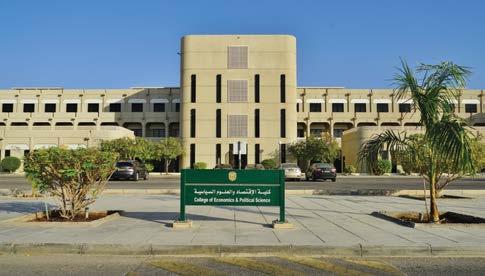

Muscat, Oman www.squ.edu.om dopsinfo@squ.edu.om, maha@squ.edu.om
The MBA program at Sultan Qaboos University plays a vital role in realizing the vision of the College of Economic and Political Science (CEPS) by strengthening its postgraduate offerings. Through consultations with experts, stakeholders, students, and alumni, as well as benchmarking with regional and international MBA programs, the existing MBA program has identified opportunities for improvements aligned with current developments and global trends.
MBA Program Highlights
• Study mode: Full-time and part-time
• Language: English
• Concentrations: General MBA, Accounting
• Duration: 24 months (full-time); 36 months (part-time)
• Accreditation: EQUIS Institutional Accreditation System
57 conomy middle eastAugust 2023
Sultan Qaboos University
Modern College of Business and Science
Qatar
Al Rayyan International University College (ARIU)
Al Rayyan/Doha, Qatar www.ariu.edu.qa register@ariu.edu.qa
The MBA program at Al Rayyan International University College (ARIU) offer a comprehensive and practical curriculum that provides sophisticated business knowledge within a global context. The program incorporates real-world scenarios and offers the option to undertake a corporate placement project instead of a traditional dissertation.
Relevant information
• Study mode: Full-time
• Language: English
• Intakes: September, February
• Tuition: $14,410.00 per semester
• Concentrations: MBA Global Hospitality Management and MBA Global
• Highlight: Graduates are eligible for the Chartered Management Institute Institute Level 7 Diploma in Strategic Management and Leadership. The MBA Global in Hospitality Management is offered in partnership with University of Derby
• Accreditation: Qatar Ministry of Eductaion and Higher Education

Arabian Gulf University
Doha, Qatar www.agu.edu.bh/en fabs@agu.edu.bh
The Arabian Gulf University MBA Program offers a dynamic and comprehensive education in business administration, providing students with essential knowledge and skills for successful leadership in today’s global business environment.
With a focus on practical application and industry relevance, the program equips students with the expertise needed to excel in diverse business roles and make a significant impact in the Arabian Gulf region.
Relevant information
• Study mode: Full-Time
• Language: English
• Duration: 18 months
• Tuition: $36,075
• Accreditation: Association to Aadvance Collegiate Schools of Business
HEC Paris in Qatar
Doha, Qatar
www.qatar.exed.hec.edu
Qatar-admissions@hec.fr
HEC Paris in Qatar offers a distinctive and demanding Executive MBA program that prepares students for future success. With a prestigious reputation for producing influential business leaders, HEC Paris has a significant number of alumni who hold top executive positions and have founded successful companies. The program encourages innovative thinking and empowers students to make a significant impact on the business landscape.
Relevant information
• Study mode: Part-time
• Intake: February
• Language: English
• Duration: 15-18 months
• Tuition: $114,000
• Accreditation: Associationto Advance Collegiate Schools of Business, Associatio of MBAs and EQUIS
Qatar University
Doha, Qatar www.qu.edu.qa qumcc@qu.edu.qa, info@qu.edu.qa
The College of Business and Economics’ MBA program develops leaders through a holistic approach that combines the academic foundation acquired in the business curriculum with a broad range of opportunities for personal maturation and professional growth. The MBA program endows individuals with the knowledge, insights, and abilities to make significant positive contributions to the organizations and societies they serve.
Relevant information
• Language: English
• Intake: September
• Tuition: $19,777
• Concentrations: Business Analytics, Entrepreneurship
• Accreditation: Association to Advance Collegiate Schools of Business
• Ranking: #2 in QS Global MBA Rankings 2023: Middle East and Africa
58 conomy middle east August 2023
MBA list
Qatar University
Saudi Arabia
College of Business Administration in Jeddah
Jeddah, Saudi Arabia
www.ubt.edu.sa
cba.info@ubt.edu.sa
The College of Business Administration in Jeddah offers a comprehensive MBA program designed to equip business leaders with the knowledge, skills, and initiative necessary to manage organizations. The two-year, 48-credit curriculum provides options for concentrations in areas such as Accounting, Finance, Human Resources Management, International Business Administration, Management Information System, Marketing, Supply Chain, and Operations Management. The program includes a combination of core and concentration courses, allowing flexibility for working professionals to balance their studies with their professional commitments.
Relevant information
• Study mode: Full-Time
• Tuition: $27,750
• Accreditation: Association to Advance Collegiate Schools of Business
• Ranking: #143 in QS World University Rankings
King
University of Petroleum and Minerals
Dhahran, Saudi Arabia www.kfupm.edu.sa/Default.aspx info@kfupm.edu.sa
The KFUPM Business School, established in 1975, offers a Master of Business Administration (MBA) and Executive MBA. Every aspect of these programs is meticulously designed to adhere to the standards set by the Association to Advance Collegiate Schools of Business. The college’s vision and mission play a crucial role in guiding its pursuit of excellence in teaching, research, and service.
Relevant information
• Languages: English, Arabic
• Duration: 24 months
• Intake: September
• Tuition: $34,700
• Accreditation: Association to Advance Collegiate Schools of Business
• Rank: 6th in QS Global MBA Rankings 2023: Middle East and Africa
Prince Sultan University
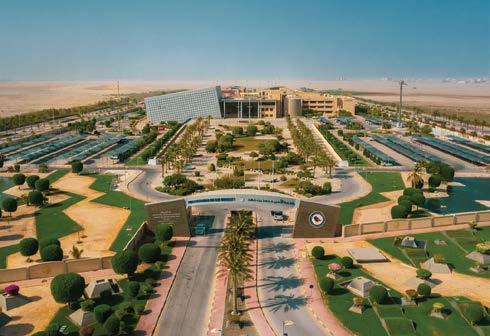
Al Khobar, Saudi Arabia
www.pmu.edu.sa
haldossary@pmu.edu.sa
The Master of Business Administration program at Prince Mohammad Bin Fahd University (PMU) is specifically tailored for professionals seeking to enhance their career opportunities by expanding their knowledge beyond their undergraduate degree. Offered through the College of Business Administration (COBA), the multidisciplinary program consists of a core curriculum of 48 credit hours, covering fundamental aspects of various business domains. Additionally, the program offers specialization options through elective courses, including the opportunity to undertake a research thesis.
Relevant information
• Language: English
• Ranking: #651-700 in QS Top Universities 2023

Riyadh, Saudi Arabia www.psu.edu.sa info@psu.edu.sa
Prince Sultan University’s MBA program focuses on nurturing students’ leadership skills, business acumen, and analytical abilities to effectively tackle intricate and unstructured business challenges by integrating ideas from diverse fields. By fostering active learning, the program equips aspiring business executives with the essential conceptual, interpersonal, and problem-solving skills needed to excel in specialized areas and industries, preparing them to become future leaders and entrepreneurs. Relevant information
• Language: English
• Duration: 24 months
• Concentrations: General MBA, Finance, Human Resource Management, Marketing
• Accreditation: Association to Advance Collegiate Schools of Business
• Ranking: #51-60 in QS World University Rankings 2023 (Arab Region)
59 conomy middle eastAugust 2023
Prince Mohammad Bin Fahd University
Fahd
King Fahd University of Petroleum and Minerals
Prince Mohammad bin Fahd University
UAE
Canadian University Dubai
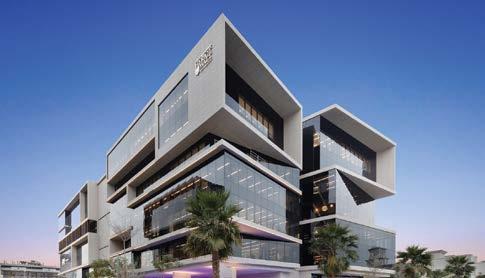

City Walk, Dubai, UAE
www.cud.ac.ae
info@cud.ac.ae
Canadian University Dubai (CUD) has an outstanding reputation for academic excellence. The university is a diverse institution, with over 120 student nationalities represented on campus. With 18 accredited degree programs and over 30 concentrations, CUD offers a wide range of study options across four academic schools and faculties, ensuring a comprehensive learning experience.
CUD’s MBA program is delivered with a range of concentrations, providing the opportunity to focus on solid business disciplines at the executive professional level. Students can choose to specialize in General Management, Finance, Human Resource Management, and Marketing.
The MBA curriculum offers a flexible schedule, with evening and weekend classes available to suit the needs of working students and professionals.
Relevant information
• Language: English
• Duration: 3 semesters
• Highlight: Students can start their MBA degree at CUD, then transfer and graduate in Canada
• Accreditation: Licensed by the UAE Ministry of Education, KSA Ministry of Education, and by the Commission for Academic Accreditation (CAA)
• Rankings: #1 University in Dubai (QS World University Rankings 2023, Times Higher Education Impact Rankings 2022), Top 2% of Global Universities (QS University Rankings, 2023)
London Business School (LBS)
Dubai International Financial Centre, UAE www.london.edu
ahaque@london.edu
London Business School (LBS) offers prestigious MBA, Executive MBA (EMBA) and masters programmes taught by leading experts in accounting, economics, finance, management science and operations, marketing, organizational behavior, and strategy and entrepreneurship. LBS’s part-time EMBA program, offered in Dubai or London, equips ambitious executives with business knowledge, leadership skills and networks to accelerate their careers.
The 20-month program is taught in block weeks, with core modules in subjects ranging from corporate finance, business ethics, data analytics and risk analysis to strategic management and operations management. Students can customize their experience in year two by choosing from over 100 elective courses taught across London and Dubai by the School’s world-class faculty and broaden their global perspective through experiential learning on a Global Experiential course. Students join the school’s international community of more than 50,000 alumni worldwide on graduation, ensuring lifelong access to the power of the LBS network.
Relevant information
• Study mode: Exceutive MBA in Dubai is part-time
• Accreditation: UAE Ministry of Education through the office of its Commission for Academic Accreditation (CAA)
• Rankings: #2 Business School in Europe, according to the Financial Times
Heriot-Watt UniversityEdinburgh Business School
Dubai Knowledge Park, UAE www.hw.ac.uk
DubaiMBA@hw.ac.uk
Heriot-Watt University Dubai - Edinburgh Business School’s full-time MBA program starts in September and January of each year. The program runs over one year, and each year is split into three semesters. Overall, the program consists of seven core courses and two electives. Each semester, students must do a minimum of two core courses.
Meanwhile, the part-time MBA program runs over two years, and each year is split into three semesters. Each semester includes a minimum of one core course.
Relevant information
• Study mode: Full-time and part-time
• Language: English
• Concentrations: Finance, Strategy
• Highlight: All graduates receive a British degree that is accredited by Royal Charter in the UK
• Accreditation: Knowledge and Human Development Authority (KHDA), initial licensure granted by the UAE Ministry of Education
• Rankings: Heriot-Watt University is 235th in the world, 32nd in UK and 5th in Scotland, according to QS World University Rankings
60 conomy middle east August 2023
MBA list
Canadian University Dubai
Heriot-Watt University
Middlesex University Dubai

Dubai Knowledge Park www.mdx.ac.ae admissions@mdx.ac.ae
Middlesex University (MDX) Dubai is the first overseas campus of the renowned Middlesex University based in London, UK. With over 18 years’ experience as a leading British higher education institution in the UAE, MDX Dubai is a 5-Star KHDA rated university and Dubai’s largest UK university licensed by KHDA for total student enrolment for three consecutive years (2021, 2022 and 2023).
The Middlesex MBA is designed to prepare students for the challenges of managing innovative teams within a complex international environment.
Students develop their understanding of the core disciplines of management and also study specialist modules related to their chosen pathway. Core modules includes Strategy and Innovation, Financial and Economic Analysis, Managing and Developing People, and Global Marketing Management.
All students complete Personal and Professional Development, Business Transformation Project and Consultancy Project modules. These are practice-based and enable students to apply their learning to real-world environments and develop their management experience, as well as analyse and plan their own professional development journeys.
MBA Program Highlights
• Study mode: Full-time and part-time MBA options
• Concentrations: MBA General, Project Management, Healthcare Management, Finance, Marketing, Operations and Supply Chain Management, Innovation and Entrepreneurship, Business Analytics
• Accreditations: Chartered Institute of Marketing (CIM), Chartered Institute of Management Accounts (CIMA), and the Financial Modeling Institute (FMI)
There are many other world-class options for MBA programs in the UAE.
These include:
• UAE University
• American University in Dubai
• American University of Sharjah
• University of Wollongong in Dubai
• Abu Dhabi University
• CASS Business School
• INSEAD
• Hult International Business School
• The University of Manchester (Middle East Center)
• SP Jain School of Global Management
Check out other MBA programs across the region by visiting our website at www.economymiddleeast.com
Strathclyde Business School UAE
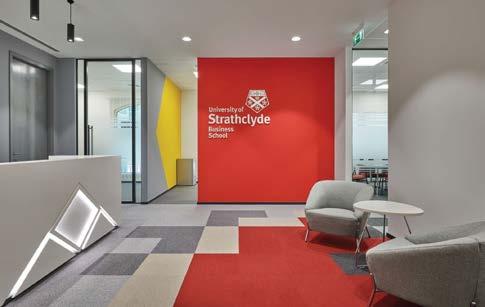
Dubai Knowledge Park, UAE www.strath.ac.uk/business sbs-uae@strath.ac.uk, reem.dabat@strath.ac.uk
Founded in 1948, the University of Strathclyde Business School is a pioneering, internationally renowned academic organisation that shapes and develops the business minds of tomorrow.
We have been offering our MBA in the UAE since 1995 and were the first international university to do so.
Strathclyde Business School is recognised as the 2023 European Entrepreneurial University of the Year by the Accreditation Council for Entrepreneurial and Engaged Universities (ACEEU), the only globally-operating quality assurance body with a focus on acknowledging engagement and entrepreneurship in Higher Education.
Relevant information
• Study mode: Part-time
• Accreditation: Association of MBAs, EQUIS, Association to Advance Collegiate Schools of Business, UAE Ministry of Education
• Rankings: Top 95 European Business Schools (Financial Times 2022), World-leading research (Research Excellence Framework (REF) 2021 with GA of 3.26
61 conomy middle eastAugust 2023
Middlesex University Dubai
Strathclyde Business School UAE
Navigating the impact of social media on kids' mental health and well-being Middle East home to some of the highest engagement with apps
 By Serene Abdul Baki
By Serene Abdul Baki
In today’s digital age, it’s difficult to imagine communication without the influence of social media. In a world driven by an abundance of content and data, it seems like there’s an app for virtually every aspect of our lives. Whether it’s a lively Discord group, a personal direct message, a captivating video or a WhatsApp broadcast, social media platforms have become the cornerstone of modern communication.
Currently, there are a whopping 4.62 billion social media users globally, a significant increase compared to the 1.48 billion users recorded in 2012, showing a growth rate of 3.1 times. Remarkably, approximately 1 million new users join these platforms every single day, and Arab countries stand out prominently among the regions with the highest social media adoption. In fact, the United Arab Emirates, Bahrain and Qatar have
emerged as global leaders in embracing social media as of April this year.
YouTube, for instance, boasts the highest user base, starting with Lebanon and followed by Bahrain and Oman. Meanwhile, Egypt houses the seventh-largest audience on Facebook. Notably, Saudi Arabia stands out with 29.5 million social media users, with nearly 98 percent of them being young people.
While research hasn’t explicitly concluded that social media is unsafe for children, it’s evident that there are substantial obstacles to fully comprehending its impact on mental health. However, a growing body of evidence indicates that social media usage can have negative consequences. As the world grapples with an escalating mental health crisis among the youth, it becomes imperative to question the role of social media in exacerbating these issues.
conomy middle east August 2023
Lifestyle
The numbers
A significant proportion of today’s youth is highly active on social media platforms, with 95 percent of teenagers and 40 percent of children aged between 8 and 12 being engaged in online activities. On average, users spend approximately three and a half hours each day on social media. However, research has shown that prolonged screen time and excessive use of social media, exceeding three hours a day, can double the risk of depression and anxiety in individuals.
Moreover, the impact of social media on self-perception is a growing concern. The use of “beautified” filters may contribute to a distorted sense of self and lead to negative body image issues, as users may come to feel less attractive without them. Shockingly, a substantial 46 percent of adolescents admit that social media makes them feel worse about their body image. The digital anonymity available on social media platforms provides a breeding ground for hurtful and harmful behavior. Unfortunately, statistics following the COVID-19 pandemic have revealed a significant increase in online exposure to hate speech in recent years. Despite age regulations intended to protect children from negative content, these restrictions have not proven as effective as desired. Consequently, cyberbullying victims often suffer profound psychological distress, feelings of isolation and depression.
A recent research study conducted in Saudi Arabia investigated the relationship between social media and mental health. The findings highlighted that certain features of social media, such as likes, comments, and followers, can have a particularly detrimental impact on mental well-being. Individuals who use social media as a means of seeking external validation are more susceptible to experiencing stress, depression and anxiety.
On the flip side
The abundance of information available on the internet has transformed it into an indispensable tool for learning and connecting with the world. Additionally, the increasing prevalence of communityled movements worldwide emphasizes the importance of staying informed through online channels to access first-hand accounts.
In a study conducted a couple of years ago, it was found that more than 25 percent of young individuals aged between 14 and 22, who were dealing with depression, considered social media to be a crucial tool in their recovery. They reported that it provided them with valuable support and advice, which made them feel less isolated. Thanks to their online community, they could distinguish between harmful and helpful guidance. However, the challenge lies in the fact that they feel compelled to continue engaging with social media due to the overwhelming abundance of such content online.

How can we address this issue?
Around 80 percent of parents firmly believe that tech companies should bear responsibility and be held accountable for the lack of regulations on social media platforms. Parents and health specialists in the United States are urgently calling on big tech to implement and enforce safety regulations on their products. As mental health gains prominence in both public and private discussions, open dialogues about young people’s online experiences can play a crucial role in mitigating the negative repercussions of excessive social media use. If your children are still young, consider delaying the age at which they start using social media. While the regulatory age set by social media platforms is 13 years, recent data shows that 40 percent of youth aged 8 to 12 are already active online, indicating a lack of adherence to the regulations. For those whose kids are already using social media, it’s essential to openly address the potential dangers of being online. Engaging in realistic conversations with your children and teenagers not only fosters dialogue and expression but also emphasizes the seriousness of using a smartphone app responsibly. In an increasingly isolating world, community remains one of the most vital pillars of our society. Social media has facilitated unprecedented connections with individuals worldwide, spanning interests in fashion, gaming, sports and more.
However, along with the possibilities, social media has introduced challenges to our children’s safety and mental well-being. Certain aspects of a child’s life, such as sleep, in-person interactions, genuine connections, and physical activities, should ideally be tech-free spaces. Encouraging mindful engagement with social media is crucial. If mindless scrolling contributes to negative feelings or changes in mood, it might be time to disconnect and prioritize mental well-being.
63 conomy middle eastAugust 2023
Ferrari unveils SF90 XX STRADALE and SF90 XX SPIDER, marque's first roadgoing XX program cars
Limited production exotics masterpieces of design and engineering
By Alp Sarper
Ferrari has introduced its latest marvels, the SF90 XX STRADALE and SF90 XX SPIDER, a thrilling fusion of the Special Series and the XX programs. This marks the inception of the first-ever road-going cars in the XX program. The grand unveiling took place at Ferrari’s private circuit in Fiorano, witnessed by Economy Middle East magazine. Production of these exclusive models is limited, with only 799 units of the SF90 XX STRADALE and 599 units of the SF90 XX SPIDER allocated exclusively to discerning Ferrari clients. The SF90 XX STRADALE is expected to arrive in Q2 of 2024, while the SF90 XX SPIDER will hit the roads in Q4 of the same year. Building upon the foundation of the original SF90 Stradale introduced in 2019, these new iterations ascend to unparalleled heights in performance and driving experience. Enhanced aerodynamics with a fixed rear spoiler reminiscent of the iconic F50 contribute to a boost in performance, generating an impressive 530 kg of downforce at 250 km/h, translating into improved grip and faster lap times.
The SF90 XX STRADALE boasts the most efficient aerodynamic performance ever seen in a road-going Ferrari, rivaling even the revered LaFerrari supercar. The engineers also meticulously redesigned the car’s soundtrack to elevate the driving experience, channeling the racing soul of Ferrari’s V8 engine and transmitting combustion pulsations into the cabin with heightened frequencies, creating a rich explosion of Ferrari’s V8 symphony.
The SF90 XX STRADALE features a PHEV layout, seamlessly integrating a 4-liter V8 Turbo engine with three electric motors. The car’s total power output is an impressive 1030 bhp, with
the V8 engine generating 797 bhp. The three electric motors contribute 233 bhp and are equipped with a patented extra boost vehicle dynamics logic. The high-performance lithiumion battery grants the car a 25 km range in full-electric mode. The car offers four different power management modes, including eDrive, Hybrid, Performance, and Qualifying, each offering a unique driving experience. The SF90 XX STRADALE can accelerate from 0 to 100 km/h in just 2.3 seconds and reach 0-200 km/h in 6.5 seconds, with a top speed of 320 km/h.
The SF90 XX STRADALE boasts a radical and bold design language, with prominent carbon-fiber elements throughout the bodywork, larger exposed air intakes, and vents. The fixed wing at the rear contributes to the iconic long tail silhouette, giving the car a racing car-inspired look. Inside the cockpit, the focus remains on the racing style while keeping weight in check. Technical fabrics and carbon-fiber are used strategically to create a functional and sporty environment. The racing seats are specifically designed for the SF90 XX STRADALE and SF90 XX SPIDER, boasting visible carbon-fiber tubular structures for both sporty driving experience and comfort. The seamless design allows for multiple adjustments. The SF90 XX STRADALE stands as a true testament to Ferrari’s talent and hard work, combining automotive genius, artistry, and engineering excellence. It continues the legacy of Enzo Ferrari, paying homage to the legendary 125 of more than 76 years ago. With limited production and exceptional performance, the SF90 XX STRADALE and SF90 XX SPIDER are set to captivate Ferrari enthusiasts and automotive connoisseurs worldwide.

Lifestyle
Europe, Middle East, Eurasia & Africa (EMEA)














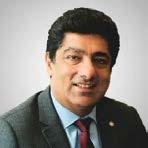










65 conomy middle eastAugust 2023 CONFIRMED SPEAKERS INCLUDE Regional Vice President Lodging Development ME Marriott International ANAND Founder & CEO Leva Hotels & Resorts GUY HUTCHINSON President & CEO Rotana KEVIN JACOBS Chief Financial Officer and President, Global Development Hilton GILDA PEREZ-ALVARADO Global CEO JLL Hotels & Hospitality MARIAM AL MUSHARREKH Executive Director of Human Resources Miral RAED KUHAIL Executive Director of Digital & Technology Miral ANDREW GILMOUR Principal Economist The Economist Group SÉBASTIEN BAZIN Group Chairman & CEO and Luxury & Lifestyle Division CEO Accor
futurehospitality.com/ae THREE EXCLUSIVE DAYS OF INDUSTRY DISCUSSIONS DEAL-MAKING,
AND IMPACTFUL FOCUS ON INVESTMENT HILTON ABU DHABI YAS ISLAND 25 - 27 SEPT 2023 ORGANISED BY EMERALD SPONSORS SPONSORS GRIF EXHIBITORS SUPPORTERS GOLD SPONSORS HOST SPONSORS PLATINUM SPONSORS SILVER SPONSORS MEDIA PARTNER
KHALID SAUD ABU HAIMED Chief Executive Officer Al Khozama Investments STEPHEN SACKUR Presenter HARDTalk PUNEET CHHATWAL Managing Director & CEO The Indian Hotels Company Limited (IHCL) DIMITRIS MANIKIS President,
Wyndham Hotels & Resorts OLIVER BONKE CEO & Chairman of the Board of Management Deutsche Hospitality
NETWORKING
66 conomy middle east August 2023

































 Geoffrey Alphonso CEO, Alef Education
Geoffrey Alphonso CEO, Alef Education




















 By Marilyn Pinto
By Marilyn Pinto



 By Maroun Abou Harb
By Maroun Abou Harb


 By Jason Burnside
By Jason Burnside




 By Stuart Rees Jones
By Stuart Rees Jones


















 By Serene Abdul Baki
By Serene Abdul Baki















